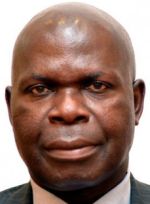
Fabiano
Fabela (Alfaro), Isidro (b. June 29, 1882, Atlacomulco, México state, Mexico - d. Aug. 12, 1964, Cuernavaca, Morelos, Mexico), governor of México (1942-45). He was also Mexican minister to Argentina and Brazil (1916-18) and Paraguay and Uruguay (1917-18).
Faber, Joseph (b. Oct. 15, 1862, Luxembourg, Luxembourg - d. Oct. 10, 1933, Luxembourg, Luxembourg), Luxembourg politician. He was minister of agriculture, commerce, industry, and labour (1917-18).
 Fabiano |
Fabião, Carlos (Soares Alberto Idães) (b. Dec. 9, 1930, Lisbon, Portugal - d. April 2, 2006, Lisbon), governor of Portuguese Guinea (1974).
Fabien-Jean-Louis, Marie-Denise (b. Feb. 14, 1944, Gonaïves, Haiti), foreign minister of Haiti (1991).
Fabini (Bianchi), Juan P(edro) (b. Nov. 6, 1876, Montevideo, Uruguay - d. Oct. 3, 1962), chairman of the National Council of Administration of Uruguay (1931-33). He was also mayor of Montevideo (1943-47).
Fabiny, Teofil (b. Oct. 11, 1822, Pest [now part of Budapest], Hungary - d. March 4, 1908, Budapest), justice minister of Hungary (1886-89).
Fabinyi, Tihamér (b. Aug. 7, 1890, Hisnyóvíz, Hungary [now Chyzné, Slovakia] - d. June 11, 1953, Boston, Mass.), finance minister of Hungary (1935-38). He was also minister of commerce (1932-35) and director of the Hungarian General Credit Bank (1938-44).
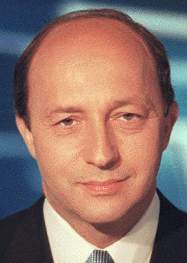 Fabius |
Fabra (Part), Alberto (b. April 6, 1964, Castellón de la Plana, Valencia, Spain), president of the Generalitat of Valencia (2011-15).
Fabre, Jean-Luc (Michel) (b. June 12, 1949, Aix-en-Provence, France), prefect of Guadeloupe (2009-11). He was also prefect of the French départements of Creuse (2009) and Indre-et-Loire (2011).
Fabre, Joseph Evariste (b. June 17, 1861, Montmeyan, Var, France - d. 19...), interim administrator of Saint-Pierre and Miquelon (1913-14).
Fabre, Louis (b. Oct. 5, 1885, Nouméa, New Caledonia - d. March 15, 1936), interim governor of Réunion (1932-34).
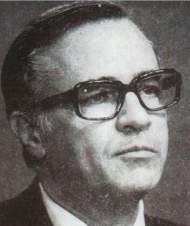 Facio |
Fack, Robbert (b. Jan. 1, 1917, Amsterdam, Netherlands - d. June 17, 2010, England), Dutch diplomat. He was permanent representative to the United Nations (1970-74) and ambassador to the United Kingdom (1976-81).
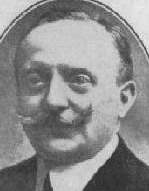 Facta |
Fadahunsi, Sir Joseph Odeleye (b. 1901, Ilesha [now in Osun state], Nigeria - d. May 12, 1986, Ilesha), governor of Western Region, Nigeria (1962-66); knighted 1963.
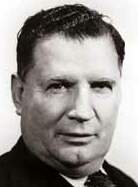 Fadden |
Fadeyev, Andrey (Mikhailovich) (b. Jan. 11, 1790 [Dec. 31, 1789, O.S.], Yamburg, St. Petersburg province [now Kingisepp, Leningrad oblast], Russia - d. Sept. 9 [Aug. 28, O.S.], 1867, Tiflis, Russia [now Tbilisi, Georgia]), governor of Saratov (1841-46).
Fadika, (Mohamed) Lamine (b. Aug. 22, 1942, Man, Ivory Coast [now Côte d'Ivoire]), Ivorian politician. He was minister of maritime affairs (1976-87), mines and energy (1993-96), and mineral and petroleum resources (1996-99).
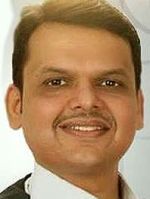 Fadnavis | 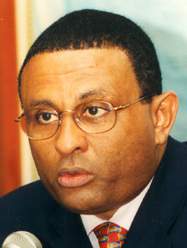 F. Fadul |  Fagan |
Fadul, Francisco (José) (b. Dec. 15, 1953, Mansoa, Portuguese Guinea [now Guinea-Bissau]), prime minister of Guinea-Bissau (1998-2000). He was a presidential candidate in 2005, finishing fourth with 2.9% of the votes.
Fadul (Fadul), José Ramón, byname Monchy (b. May 26, 1952, Santiago de los Caballeros, Dominican Republic), interior minister of the Dominican Republic (2011-16, 2018-20). He was also president of the Chamber of Deputies (1995-96) and minister of labour (2004-08, 2016-18) and industry and commerce (2008-11).
Faeser, Nancy (b. July 13, 1970, Bad Soden, Hessen, West Germany), interior minister of Germany (2021- ).
Fagan, Frank (Frederick) (b. 194...), lieutenant governor of Newfoundland and Labrador (2013-18).
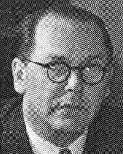 Fagerholm |
Fagerlund, Karl Adolf (Johan) (b. April 5, 1842, Karlskrona, Blekinge, Sweden - d. April 3, 1903), governor of Kalmar (1896-1903).
Fägerskiöld, Fromhold friherre (b. bf. 1650 - d. Oct. 29, 1706), governor of Närke och Värmland (1693-1706). He became friherre (baron) in 1692.
Fagundes, Bartholomeu da Rocha (b. Sept. 8, 1813, Canguaretama, Rio Grande do Norte, Brazil - d. Nov. 2, 1877, Recife, Pernambuco, Brazil), acting president of Rio Grande do Norte (1868).
Fagundes, Miguel Seabra (b. June 30, 1910, Natal, Brazil - d. April 29, 1993, Rio de Janeiro, Brazil), federal interventor in Rio Grande do Norte (1945-46) and justice and interior minister of Brazil (1954-55).
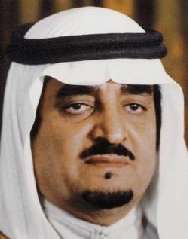 Fahd |
Fahd ibn Badr (ibn Abdul Aziz Al Saud), Saudi prince; grandson of Abdul Aziz. He was governor of al-Jawf (2002-18).
Fahd ibn Saud (ibn Abdul Aziz Al Saud) (b. 1923 - d. Aug. 21, 2006), Saudi prince; son of Saud; grandson of Abdul Aziz. He was defense minister (1957-60).
Fahd ibn Sultan (ibn Abdul Aziz Al Saud) (b. 1950), Saudi prince; son of Sultan; grandson of Abdul Aziz. He is governor of Tabuk (1987- ).
Fahey, John (Joseph) (b. Jan. 10, 1945, Wellington, N.Z. - d. Sept. 12, 2020), premier of New South Wales (1992-95) and finance minister of Australia (1996-2001).
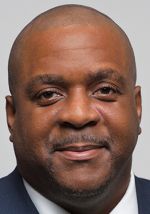 Fahie |
Fahim, Makhdoom (Mohammad) Amin, also spelled Makhdoom Ameen Faheem (b. Aug. 4, 1939, Hala, Sind, India [now in Pakistan] - d. Nov. 21, 2015, Karachi, Pakistan), Pakistani politician. He was minister of communications (1988-90), housing and works (1994-96), and commerce (2008-13).
Fahim, Mohammad (Qasim) (b. 1957 - d. March 9, 2014), defense minister (2001-04) and a vice president (2002-04, 2009-14) of Afghanistan.
Fahlström, Ludvig friherre (b. 1655, Falun, Kopparberg [now Dalarna], Sweden - d. March 19, 1721), governor of Kopparberg (acting, 1710) and Västmanland (1710-14). He was made friherre (baron) in 1714.
Fahmy, Ismail, Arabic Isma`il Fahmi (b. Oct. 2, 1922, Cairo, Egypt - d. Nov. 21, 1997, Cairo), foreign minister of Egypt (1973-77). He was ambassador to Austria in 1968-71. He resigned the foreign minister's post just days before Pres. Anwar as-Sadat's historic trip to Jerusalem on Nov. 19, 1977. During that trip, Sadat addressed the Israeli parliament and launched talks between Egypt and the Jewish state that led to the first peace treaty between an Arab state and Israel in 1979.
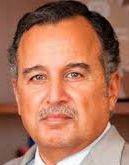 N. Fahmy |
Fahmy Pasha, Mustafa, Arabic Mustafa Fahmi Basha (b. 1840, Crete, Ottoman Empire [now in Greece] - d. Sept. 14, 1914, Alexandria, Egypt), foreign minister (1879-82) and prime minister (1891-93, 1895-1908) of Egypt. He was also minister of public works (1879), justice (1882), finance (1884-87), interior (1887-88, 1891-93, 1895-1908), and war and navy (1887-91, 1894-95).
Fåhræus, Johan Fredrik (b. March 23, 1796, Othem socken, Gotland, Sweden - d. Feb. 6, 1865, Stockholm, Sweden), Swedish politician; twin brother of Olof Fåhræus. He was minister of civil affairs (1847-56).
Fåhræus, Olof (Immanuel) (b. March 23, 1796, Othem socken, Gotland, Sweden - d. May 28, 1884, Stockholm, Sweden), governor of Göteborg och Bohus (1847-64). He was also Swedish minister of civil affairs (1840-47).
 Faidherbe |
Faik, Nasir Ahmad, Afghan diplomat. He has been chargé d'affaires at the United Nations (2021- ; representing the government deposed by the Taliban).
Fairbairn, Sir David (Eric) (b. March 3, 1917, Claygate, Surrey, England - d. June 1, 1994, Canberra, A.C.T.), defence minister of Australia (1971-72); knighted 1977. He was also minister of air (1962-64), national development (1964-69), and education and science (1971) and ambassador to the Netherlands (1977-80).
Fairbanks, Charles W(arren) (b. May 11, 1852, near Unionville Center, Ohio - d. June 4, 1918, Indianapolis, Ind.), U.S. vice president (1905-09). He was also a senator from Indiana (1897-1905). He was an unsuccessful vice presidential candidate in 1916.
Fairbanks, Erastus (b. Oct. 28, 1792, Brimfield, Mass. - d. Nov. 20, 1864, St. Albans, Vt.), governor of Vermont (1852-53, 1860-61).
Fairbanks, Horace (b. March 21, 1820, Barnet, Vt. - d. March 17, 1888, New York City), governor of Vermont (1876-78); son of Erastus Fairbanks.
Fairchild, Charles S(tebbins) (b. April 30, 1842, Cazenovia, N.Y. - d. Nov. 24, 1924, Cazenovia), U.S. treasury secretary (1887-89).
Fairchild, Lucius (b. Dec. 27, 1831, Portage county, Ohio - d. May 23, 1896, Madison, Wis.), governor of Wisconsin (1866-72). He was also U.S. minister to Spain (1880-81).
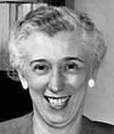 Fairclough |
Fairhall, Sir Allen (b. Nov. 24, 1909, Morpeth, N.S.W. - d. Nov. 3, 2006, Newcastle, N.S.W.), defence minister of Australia (1966-69); knighted 1970. He was also minister of interior and works (1956-58) and supply (1961-66).
Fajardo (Ulloa), Pedro (Antonio) (b. Nov. 2, 1884, Maipo, Chile - d. Oct. 27, 1952, Santiago, Chile), justice minister of Chile (1932). He was also minister of industry, public works, and railways (1922) and labour (1936-37).
Fajardo (Valderrama), Sergio (b. June 19, 1956, Medellín, Colombia), Colombian presidential candidate (2018). He was also mayor of Medellín (2004-07) and governor of Antioquia (2012-15).
Fajardo Maldonado, Arturo (b. July 10, 1938, Guatemala - d. Sept. 21, 2011), foreign minister of Guatemala (1993-94). He was also ambassador to Belgium (1976-83) and permanent representative to the United Nations (1984-86).
Fajnor, Vladimír (b. Oct. 23, 1875, Szenicz, Hungary [now Senica, Slovakia] - d. Jan. 5, 1952, Bratislava, Czechoslovakia [now in Slovakia]), justice minister of Czechoslovakia (1938). He was also minister of unification of laws (1920-21).
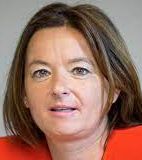 Fajon |
Fajuyi, (Francis) Adekunle (b. June 26, 1926, Ado-Ekiti, Nigeria - d. [killed] July 29, 1966, Ibadan, Nigeria), governor of Western Region, Nigeria (1966).
Fakafanua, (Kinikinilau) Tutoatasi (b. 1961 - d. Feb. 24, 2006, Nuku'alofa, Tonga), finance minister of Tonga (1995-2001). He became one of the youngest members of the Tongan cabinet when he was made minister of labour, commerce, and industries in August 1991. In May 1995 he was transferred to the finance ministry, and in January 2001 he became minister of education. He resigned from the cabinet in October 2001 after a major scandal involving an American "court jester" allegedly lost millions of dollars from a royal trust fund, of which Fakafanua was one of the trustees. He then moved to New Zealand. He became the seventh holder of the Fakafanua noble title when his father died in Hawaii in May 2004.
 Fakhfakh |
Fakhouri, Rachid, Lebanese diplomat. He was ambassador to Saudi Arabia (1972-78) and permanent representative to the United Nations (1983-90).
Fakhreddine, Mohamad (b. Oct. 12, 1924, Dueim, Sudan), Sudanese diplomat. He was ambassador to Pakistan and Afghanistan (1960-64), China (1964-65), Canada (1967-71), the Soviet Union (1972-74), and Ethiopia (1975) and permanent representative to the United Nations (1965-71).
Fakhri Pasha, Hussein, Arabic Husayn Fakhri Basha (b. Sept. 25, 1843, Cairo, Egypt - d. Dec. 23, 1910), prime minister of Egypt (1893).
Fakhri Pasha, Mahmoud, Arabic Mahmud Fakhri Basha (b. Nov. 24, 1884 - d. bf. June 7, 1955), finance minister (1920-21) and foreign minister (1922-23) of Egypt; son of Hussein Fakhri Pasha. He was also minister to France (1923-42).
Faki (Mahamat), Moussa (b. June 21, 1960, Biltine, Chad), prime minister (2003-05) and foreign minister (2008-17) of Chad and chairman of the Commission of the African Union (2017- ). He was also minister of public works and transport (2002-03).
 Fakudze | 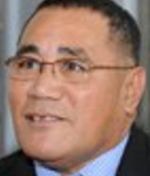 Falani | 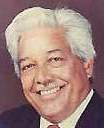 Falcam |
Falani, Sir Tofiga (Vaevalu), governor-general of Tuvalu (2021- ).
Falbe, Hans Hagerup (b. Feb. 7, 1772, Copenhagen, Denmark - d. Oct. 17, 1830, Stockholm, Sweden), governor of Aggershuus (1815-22). He was also Norwegian minister of auditing (1824-25, 1828-29) and navy (1826-27).
Falcam, Leo A(my) (b. Nov. 20, 1935, Awak, Pohnpei, Micronesia - d. Feb. 12, 2018), president of the Federated States of Micronesia (1999-2003). He was also district administrator (1972-76) and governor (1979-83) of Ponape and vice president (1997-99).
Falcão, Armando (Ribeiro Severo) (b. Nov. 11, 1919, Fortaleza, Brazil - d. Feb. 10, 2010, Rio de Janeiro, Brazil), justice and interior minister (1959-61) and justice minister (1974-79) of Brazil. He was also acting minister of health (1961).
Falcão, Sebastião Marinho Muniz (b. Jan. 6, 1915, Ouricuri, Pernambuco, Brazil - d. July 14, 1966, Maceió, Alagoas, Brazil), governor of Alagoas (1956-57, 1958-61).
Falcioni, Alfredo (b. June 9, 1868, Domodossola, Piemonte, Italy - d. July 4, 1936, Ghiffa, Piemonte), justice minister of Italy (1920). He was also minister of agriculture (1920).
Falck, Iman Willem (b. March 23, 1736 - d. Feb. 6, 1785), governor of Ceylon (1765-85).
Falcoianu, Stefan (b. June 6, 1835, Bucharest, Walachia [now in Romania] - d. Jan. 22, 1905, Bucharest), war minister of Romania (1884-86). He was also chief of the General Staff (1877-78, 1883-84, 1886-94).
Falcón (Fuentes), Henri (José) (b. June 17, 1961, Nirgua, Yaracuy, Venezuela), governor of Lara (2008-17). He was also mayor of Barquisimeto (2000-08) and a presidential candidate (2018).
Falcón Briceño, Marcos (b. April 4, 1907, Barcelona, Anzoátegui, Venezuela - d. April 22, 1998, Caracas, Venezuela), foreign minister of Venezuela (1960-64). He was also chargé d'affaires (1946-47) and ambassador (1958-60) to the United States and ambassador to the United Kingdom (1964-65).
Falconer of Thoroton, Charles Leslie Falconer, Baron (b. Nov. 19, 1951, Edinburgh, Scotland), British lord chancellor (2003-07). He was also solicitor general (1997-98). He was made a life peer in 1997.
 Falconí | 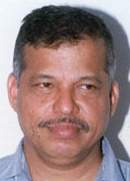 Faleiro |
Falefou, Tapugao (b. 1968), Tuvaluan diplomat. He has been permanent representative to the United Nations (2023- ).
Faleiro, Luizinho (b. Aug. 26, 1951, Navelim village, Goa, Portuguese India [now in India]), chief minister of Goa (1998-99).
Faletau, Inoke Fotu, 13th Akau'ola (b. June 24, 1937, Neiafu, Tonga - d. Oct. 6, 2005, Nuku'alofa, Tonga), Tongan diplomat. He was high commissioner to the United Kingdom (1972-82), ambassador to France (1972-82), West Germany (1976-82), Belgium, Luxembourg, and the Netherlands (1977-82), the United States (1979-82), the Soviet Union (1980-82), and Denmark (1981-82), and governor of Vava'u (2002-05).
Falih, Khalid (ibn Abdul Aziz) al- (b. 1960, Riyadh, Saudi Arabia), Saudi politician. He was president of Saudi Aramco (2009-15) and minister of health (2015-16) and energy, industry, and mineral resources (2016-19).
Falk, John Ludvig (b. Oct. 2, 1873, Stockholm, Sweden - d. April 17, 1956), governor of Kalmar (1917-38).
Falkenberg af Trystorp, Gabriel (Gabrielsson) friherre (b. Feb. 13, 1716 - d. Feb. 24, 1782, Årdala socken, Södermanland, Sweden), governor of Skaraborg (1748-61) and Västmanland (1761-63); son of Gabriel (Henriksson) friherre Falkenberg af Trystorp.
Falkenberg af Trystorp, Gabriel (Henriksson) friherre (b. Nov. 28, 1685, Stockholm, Sweden - d. Aug. 22, 1756, Hassle socken, Skaraborg [now in Västra Götaland], Sweden), governor of Skaraborg (1735-48); son of Henrik Falkenberg af Trystorp. He was made friherre (baron) in 1733.
Falkenberg af Trystorp, Göran Henrik friherre (b. April 19, 1746, Lund, Malmöhus [now in Skåne], Sweden - d. Sept. 23, 1803, Trollebo, Jönköping, Sweden), governor of Kronoberg (1787-93); grandnephew of Henrik Falkenberg af Trystorp.
Falkenberg af Trystorp, Henrik (b. March 10, 1634, Stockholm, Sweden - d. Dec. 2, 1691, Stockholm), governor of Älvsborg (1674-76).
Falkengren, Germund Abraham friherre (b. April 20, 1713, Ryssby socken, Kronoberg, Sweden - d. March 3, 1785, Stenbrohult socken, Kronoberg), governor of Västernorrland (1769-78). He was made friherre (baron) in 1771.
Falkenhausen, (Ernst) Alexander (Alfred Hermann Freiherr) von (b. Oct. 29, 1878, Blumenthal, Germany [now Kwiatków, Poland] - d. July 31, 1966, Nassau, West Germany), German military governor of Belgium and northern France (1940-44).
Fall, (Papa) Cheikh Sadibou (b. Aug. 28, 1950, Dakar, Senegal), interior minister of Senegal (2004). He was also minister of urban planning and housing (2000-01) and fisheries (2001) and ambassador to Italy (2005-13).
 F.L. Fall |
Fall, (Cheikh) Ibrahima (b. 1942, Tivaouane, Senegal), foreign minister of Senegal (1984-90). He was also higher education minister (1983-84), UN special representative to the Great Lakes Region (2002-07), and a minor presidential candidate (2012).
Fall, Médoune (b. July 21, 1919, Saint-Louis, Senegal - d. Feb. 3, 2007, Dakar, Senegal), interior minister (1981-83) and defense minister (1983-93) of Senegal. He was also ambassador to France (1964-66), Spain (1965-66), Belgium (1966-68), the Soviet Union (1968-71), and Japan (1979-80) and permanent representative to the United Nations (1971-79).
Fall, Moujtaba Ould Mohamed, interior minister of Mauritania (1977-78). He was also minister of commerce and transport (1977) and justice and Islamic affairs (1978).
Fall, Papa Louis (b. 1943, Louga, Senegal), Senegalese diplomat. He was ambassador to Cameroon (1984-88), Chad and the Central African Republic (1986-88), and Ethiopia (1988-2001) and permanent representative to the United Nations (2001-04).
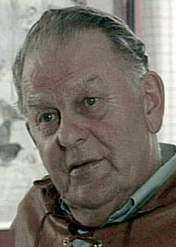 Fälldin |
Fallenius, Bertil (Albertsson) (b. April 22, 1900, Stockholm, Sweden - d. Aug. 17, 1990, Stockholm), governor of Blekinge (1948-56) and Skaraborg (1956-67).
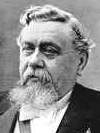 Fallières |
Fallon, Sir Michael (Cathel) (b. May 14, 1952, Perth, Scotland), British defence secretary (2014-17); knighted 2016.
Falsen, Carl Valentin (b. May 27, 1787, Christiania [now Oslo], Norway - d. April 14, 1852, Christiansand [now Kristiansand], Lister og Mandal amt [now in Agder fylke], Norway), governor of Bratsberg amt (1839-46), Lister og Mandal amt (1846-52), and Christiansand stift (1846-52); brother of Christian Magnus Falsen.
Falsen, Christian Magnus (b. Sept. 14, 1782, Christiania [now Oslo], Norway - d. Jan. 13, 1830, Christiania), governor of Nordre Bergenhus amt (1814-22) and Bergen stift and Søndre Bergenhus amt (1825-27). He was also Norwegian procurator-general (1822-25) and chief justice of the Supreme Court (1827-30).
Falsen, Johan Collett (b. Sept. 9, 1817, Aker [now part of Oslo], Norway - d. Sept. 2, 1879, Kristiania [now Oslo], Norway), governor of Nordre Bergenhus amt (1861-69); nephew of Carl Valentin Falsen and Christian Magnus Falsen. He was also Norwegian minister of justice and police (1870, 1871-72, 1874-77, 1878-79), navy and postal affairs (1871), and interior (1872-73).
Faltan, Samuel (b. Feb. 22, 1920, Hradiste, Czechoslovakia [now in Slovakia] - d. Dec. 15, 1991, Bratislava, Slovakia), a deputy premier of Czechoslovakia (1969).
Faltzburg, Axel friherre, formerly (1648-1710) Axel von Faltzburg (b. June 1645 - d. Sept. 18, 1728, Halmstad, Halland, Sweden), governor of Älvsborg (1708-10) and Halland (1710-28). His family was ennobled in 1648 and he was made friherre (baron) in 1710.
Faltzburg, Gustaf friherre, originally Gustaf von Faltzburg (b. Nov. 25, 1650, Stettin, Sweden [now Szczecin, Poland] - d. Oct. 11, 1719, Stockholm, Sweden), governor of Kronoberg (1701-10); brother of Axel friherre Faltzburg. He became friherre (baron) in 1710.
Faluvégi, Lajos (b. Oct. 22, 1924, Mátraderecske, Hungary - d. Dec. 5, 1999, Budapest, Hungary), finance minister of Hungary (1971-80). He was also a deputy premier and chairman of the National Planning Office (1980-86).
Falvy, Maurice (Émile) (b. March 4, 1888, Reims, France - d. June 2, 1970, Mézy-sur-Seine, Yvelines, France), acting commandant of Chad (1935-36) and lieutenant governor of Niger (1940-42).
 Fan K. |
Fan Shouyou (b. 18..., Kaifeng, Henan, China - d. July 24, 1916, most probably Wuhan, Hubei, China), civil governor of Hubei (1916). He was the civil governor of Heilongjiang in the late Qing period, and became the person in charge of military training affairs of Henan province after the foundation of the republic. He held several posts in Hubei before being named as governor. He died in office.
Fan Yaonan (b. 1879, Gongan, Hubei, China - d. July 7, 1928, Dihua [now Ürümqi], Xinjiang, China), governor of Xinjiang (1928). He studied law in Japan and was made the dean of the Xinjiang Law and Politics College and later the director of the Dihua municipal court. After that, he became an adviser of the Hubei government and then the president's office. He started his career as a magistrate in Xinjiang province in 1917, being mayor of Aksu and then Dihua. In the 1920s, he was named the director of the Bureau of Military Affairs in Xinjiang, thus getting the chance to control some of Gov. Yang Zengxin's army. He led a coup against Yang Zengxin, killing the latter, in July 1928. But Fan himself was shot in the mutiny that followed.
 Fanfani |
Fang Benren (b. 1880, Huanggang, Hubei, China - d. Feb. 15, 1951, Tianjin, China), military governor of Jiangxi (1924-26) and chairman of the government of Hubei (1929). A graduate of the Beijing College of Commanders, he started his military career in the Jiangxi provincial army. He was named commander of the 11th Army as well as a member of the military committee of the National Government in 1926. He was also a member of the Military Senate. He stayed out of public life since World War II.
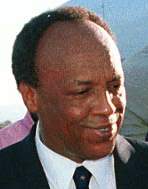 Ali A. Farah |  H.A. Farah |
Farah, Hassan Abshir, Somali Xasan Abshir Faarax (b. June 20, 1945, Nugaal region, Somalia - d. July 11/12, 2020, Ankara, Turkey), prime minister of Somalia (2001-03). He was also mayor of Mogadishu (1973-76, 1982-87), ambassador to Japan and South Korea (1987-89) and Germany and Austria (1989-98), and minister of water and mineral resources (2000-01) and fisheries and marine resources (2004-07); in 1998-2000 he was interior minister of the self-declared state of Puntland.
Farah, Mohamed Dini (b. 1943, Tadjoura, French Somaliland [now Djibouti]), Djiboutian politician. He was minister of civil service and administrative reform (1995-97), public works (1997), justice (1997-99), and health (1999-2001).
Farah, Moumin Bahdon (b. Oct. 24, 1939, Djibouti, French Somaliland [now Djibouti] - d. Sept. 1, 2009, Paris, France), interior minister (1977-78), foreign minister (1978-93), and justice minister (1993-96) of Djibouti.
Färber, Adolf (b. Nov. 11, 1912, Berlin, Germany - d. Nov. 27, 1987, Karl-Marx-Stadt, East Germany [now Chemnitz, Germany]), first secretary of the Socialist Unity Party of Suhl district (1952-54).
Farchi (Sultán), Isaac (b. June 12, 1960, Guatemala City, Guatemala), Guatemalan politician. He was a minor presidential candidate in 2019.
Farell Cubillas, Arsenio (b. June 30, 1921, Mexico City, Mexico - d. May 15, 2005, Tecamachalco, México, Mexico), Mexican politician. He was minister of labour and social security (1982-94) and comptroller-general and minister of administrative development (1995-2000).
Faremo, Grete (b. June 16, 1955, Bygland, Aust-Agder [now in Agder], Norway), defense minister of Norway (2009-11). She has also been minister of development cooperation (1990-92), justice (1992-96, 2011-13), and oil and energy (1996) and executive director of the United Nations Office for Project Services (2014- ).
Farès, Abderrahmane, Arabic `Abd ar-Rahman Faris (b. Jan. 30, 1911, Akbou, Kabylie, Algeria - d. May 13, 1991, Zemmouri, east of Algiers, Algeria), chairman of the Provisional Executive of Algeria (1962).
Fargo, Heather (b. Dec. 12, 1952, Oakland, Calif.), mayor of Sacramento (2000-08).
Farhang, Mansour (b. 1936, Sari, Iran), Iranian diplomat. He was permanent representative to the United Nations (1979-80).
Farhat, Abdallah (b. Aug. 28, 1914, Ouerdenine, Tunisia - d. Sept. 29, 1985, Tunis, Tunisia), defense minister (1972-74, 1976-79) and interior minister (1977) of Tunisia. He was also minister of transport and communications (1964-69, 1974-76), agriculture (1969-71), and supply (1974).
Faria, Antão Gonçalves de (b. Jan. 17, 1854, São Sapé, Rio Grande do Sul, Brazil - d. Feb. 4, 1936, Porto Alegre, Rio Grande do Sul), acting finance minister of Brazil (1891). He was also minister of agriculture, transport, and public works (1891-92).
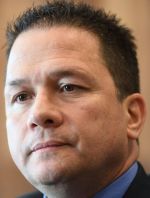 C. Faría |
Faría (Pineda), Jacqueline (Coromoto) (b. Feb. 3, 1957), chief of government of Distrito Capital (2009-14, 2020-21). She was also Venezuelan minister of environment and natural resources (2005-07) and communication and information (2014-15).
Faria, Joaquim de Almeida, Sobrinho (b. Aug. 13, 1847, Lapa, São Paulo [now in Paraná], Brazil - d. Sept. 10, 1893, Paranaguá, Paraná), president of Paraná (1885 [acting], 1886-87).
Faria, José Caetano de (b. March 21, 1855, Rio de Janeiro, Brazil - d. Aug. 16, 1936, Rio de Janeiro), war minister of Brazil (1914-18).
Faria, Juvenal Lamartine de (b. Aug. 9, 1874, Serra Negra do Norte, Rio Grande do Norte, Brazil - d. April 18, 1956, Natal, Rio Grande do Norte), president of Rio Grande do Norte (1928-30).
Faria, Robinson Mesquita de (b. April 12, 1959, Natal, Rio Grande do Norte, Brazil), governor of Rio Grande do Norte (2015-19).
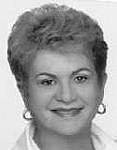 W.M. de Faria |
Farias, Elmo Serejo (b. April 7, 1928, São Luís, Maranhão, Brazil - d. Oct. 14, 1994, Salvador, Bahia, Brazil), governor of Distrito Federal (1974-79).
Farías (Peña), Érika (del Valle) (b. Oct. 31, 1972), governor of Cojedes (2012-16) and mayor of Libertador (2017-21). She was also Venezuelan minister of food (2006-07), social development and popular participation (2008-09), communal affairs (2009-10), communes and social movements (2016-17), and urban agriculture (2017).
Farías (Martínez), Luis M(arcelino) (b. June 7, 1920, Monterrey, Nuevo León, Mexico - d. April 3, 1999, Cuautla, Morelos, Mexico), governor of Nuevo León (1971-73). He was also president of the Chamber of Deputies (1969-70) and mayor of Monterrey (1986-88).
Farias, Osman Loureiro de (b. July 27, 1895, Maceió, Alagoas, Brazil - d. July 24 or 25, 1979, Maceió), federal interventor/governor of Alagoas (1934-35, 1935-40).
Farias, Osvaldo Cordeiro de (b. Aug. 16, 1901, Jaguarão, Rio Grande do Sul, Brazil - d. Feb. 17, 1981, Rio de Janeiro, Brazil), federal interventor in Rio Grande do Sul (1938-43) and governor of Pernambuco (1955-58).
Farias, Wilmar Peres de (b. May 14, 1939, Barra do Garças, Mato Grosso, Brazil - d. March 15, 2006, Barra do Garças), acting governor of Mato Grosso (1986-87).
Farid Kuhestani, (Ustad) Abdul Sabur (b. 1952, Chashma Allah Dad Khan village, Parwan province, Afghanistan - d. May 2, 2007, Kabul, Afghanistan), prime minister of Afghanistan (1992). He was prime minister for just over a month as the civil war erupted between the commanders of groups that had recently overthrown the Communist government. He was a member of the radical Islamist Hezb-i-Islami party led by Gulbuddin Hekmatyar. In December 2005 he was appointed by Pres. Hamid Karzai as a member of the Meshrano Jirga (upper house of parliament). He was shot dead outside his home by unknown assailants.
Farkas, Mihály, original name Hermann Löwy (b. July 18, 1904, Abaújszántó, Hungary - d. Dec. 6, 1965, Budapest, Hungary), defense minister of Hungary (1948-53).
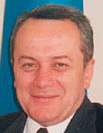 Farkhutdinov |
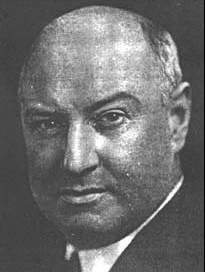 Farley |
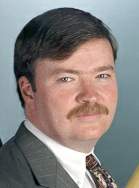 Farmer |
Faro, José Dionísio Carneiro de Sousa e (b. Jan. 24, 1871, Ribandar, Portuguese India [now in Goa, India] - d. June 25, 1962, Lisbon, Portugal), governor-general of Angola (1930-31). He was also Portuguese navy minister (1918-19).
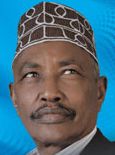 Farole |
Faron, Joseph (b. Dec. 12, 1819, Brest, Finistère, France - d. Nov. 19, 1881), acting governor of Cochinchina (1869-70).
Faron, Pierre Aristide (b. April 17, 1814, Brest, Finistère, France - d. 1879), governor of French India (1871-75) and Réunion (1875-79).
Farquhar, Sir Robert Townsend, (1st) Baronet (b. Oct. 14, 1776 - d. March 16, 1830, London, England), lieutenant governor of Prince of Wales Island (1804-05) and governor of Île Bourbon (1810, 1811) and Mauritius (1810-23). He was created a baronet in 1821.
Farra, Jamal al- (b. 1911, Damascus, Ottoman Empire [now in Syria] - d. Sept. 30, 2005), foreign minister of Syria (1962). He was ambassador to Sweden (also non-resident ambassador to Norway, Denmark, and Finland) in the early 1950s. In 1955, he was appointed ambassador to West Germany and in 1956, ambassador to the U.S.S.R. (also non-resident ambassador to Poland). In 1958, Syria and Egypt merged to form the United Arab Republic (U.A.R.) and he became U.A.R. ambassador to Brazil, holding office until Syria separated again in 1961. After his tenure as foreign minister, he was appointed ambassador to West Germany again, until 1963, and thereafter ambassador to Italy, until retiring from diplomatic activity in 1964.
Farra, Muhammad Hussein al- (b. April 20, 1927, Khan Yunis, Palestine - d. 2009), Jordanian diplomat. He was permanent representative to the United Nations (1965-71) and ambassador to Spain (1971).
Farra-Frond, François (b. Aug. 21, 1939, Fort Sibut, Oubangui-Chari [now Central African Republic]), Central African Republic politician. He was minister of state for finance (1980-81).
 Farrakhan |
 E.J. Farrell |
Farrell, Norm, New Zealand diplomat. He was permanent representative to the United Nations (1968-69) and ambassador to South Vietnam and the Khmer Republic (1974-75).
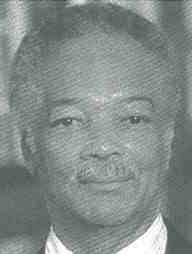 Farrelly |
Farrugia, Michael, home affairs and national security minister of Malta (2017-20). He has also been minister of health, care for the elderly, and family affairs (1996-98), family and social solidarity (2014-17), energy and water management (2020), and senior citizens and active ageing (2020- ).
 Faruq |
Faruque (Khan), Ghulam (b. Oct. 7, 1899, Midnapore, Bengal [now in West Bengal], India - d. 1992), governor of East Pakistan (1962). He was also Pakistani minister of commerce (1965-67).
Faseyev, Kamil (Fatykhovich) (b. May 10, 1919, Timyashevo, Samara province [now in Tatarstan republic], Russia - d. April 2, 2005, Kazan, Tatarstan, Russia), chairman of the Presidium of the Supreme Soviet of the Tatar A.S.S.R. (1959-60).
Fashola, Babatunde Raji (b. June 28, 1963, Lagos, Nigeria), governor of Lagos (2007-15). He has also been Nigerian minister of power, works, and housing (2015- ).
Fasi, Frank F(rancis) (b. Aug. 27, 1920, East Hartford, Conn. - d. Feb. 3, 2010, Honolulu, Hawaii), mayor of Honolulu (1969-81, 1985-94).
Fassassi, Kamarou (b. Oct. 10, 1948, Porto-Novo, Dahomey [now Benin] - d. Dec. 4, 2016, Cotonou, Benin), Beninese politician. He was minister of public works and transport (1996-98) and mines, energy, and water resources (2001-06) and a minor presidential candidate (2006).
 Fassi Fihri | 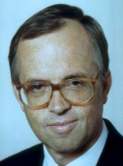 Fasslabend |
Fassino, Piero (Franco Rodolfo) (b. Oct. 7, 1949, Avigliana, Torino province [now Torino metropolitan city], Piemonte, Italy), justice minister of Italy (2000-01). He was also minister of foreign trade (1998-2000) and mayor of Turin (2011-16).
Fasslabend, Werner (b. March 5, 1944, Marchegg, Niederdonau, Germany [now Niederösterreich, Austria]), defense minister of Austria (1990-2000).
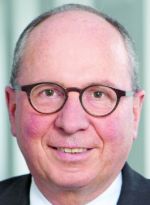 F. Fässler |  U. Fässler |
Fässler, (Johann) Josef Anton (Floridus) (b. April 23, 1796, Appenzell, Appenzell Innerrhoden, Switzerland - d. Nov. 8, 1875, Appenzell), Landammann of Appenzell Innerrhoden (1843-45, 1847-49, 1851-53).
Fässler, Ulrich (b. Nov. 28, 1943), Schultheiss of Luzern (1995, 2002).
Fast, Edward (b. June 18, 1955, Winnipeg, Man.), acting foreign minister of Canada (2015). He was minister of international trade (2011-15).
Fatemi, Hossein (b. 1917, Isfahan, Iran - d. [executed] Nov. 10, 1954, near Tehran, Iran), foreign minister of Iran (1952-53). An associate of Mohammad Mossadegh, he was condemned to death on Oct. 10, 1954, for rebellion against the monarchy.
Fateyev, Valery (Petrovich) (b. June 2, 1946), head of the administration of Smolensk oblast (1991-93).
Fath Ali Qajar (b. Sept. 5, 1772, Damghan, Persia [Iran] - d. Oct. 23, 1834, Isfahan, Persia), shah of Persia (1797-1834).
Fatima, Rabab, Bangladeshi diplomat. She has been ambassador to Japan (2016-19), permanent representative to the United Nations (2019-22), and UN high representative for the least developed countries, landlocked developing countries, and small island developing states (2022- ).
Fatimie, Sayed Mohammad Amin (b. Jan. 15, 1952, Nangarhar province, Afghanistan), Afghan politician. He was public health minister (1993-95, 2004-10) and ambassador to Japan (2010-17).
Fatkulov, Nurgaly (Gizetovich) (b. 1900, Yakutsk, Russia - d. ...), chairman of the Council of People's Commissars of the Yakut A.S.S.R. (1938-40). He was also people's commissar of workers' and peasants' inspection (1931-34) and mayor of Yakutsk (1944-46).
Fattal, Dia Allah al- (b. March 5, 1927, Damascus, Syria), Syrian diplomat. He was ambassador to the Vatican (1977-81) and permanent representative to the United Nations (1981-86, 1990-92).
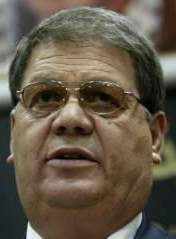 Fattouh |
Fau, Yamandú (b. March 21, 1945), defense minister of Uruguay (2002-05). He was also education and culture minister (1998-2000).
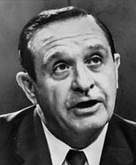 Faubus |
Fauché, Pierre (b. March 15, 1913 - d. April 16, 1996), resident of Wallis and Futuna (1958-61).
Faucher, Léon(ard Joseph) (b. Sept. 8, 1803, Limoges, Haute-Vienne, France - d. Dec. 14, 1854, Marseille, France), interior minister of France (1848-49, 1851). He was also minister of public works (1848).
Faulkner, Arthur James (b. Nov. 20, 1921, Grey Lynn, Auckland, New Zealand - d. May 15, 1985), defence minister of New Zealand (1972-74). He was also minister of labour and state services (1974-75) and president of the Labour Party (1976-79).
Faulkner, John (Philip) (b. April 12, 1954, Leeton, N.S.W.), defence minister of Australia (2009-10). He was also minister of veterans' affairs and defence science and personnel (1993-94) and environment, sport, and territories (1994-96).
Faulkner, Padraig (b. March 12, 1918, Dundalk, County Louth, Ireland - d. June 1, 2012, Drogheda, County Louth), defence minister of Ireland (1979-80). He was also minister of Gaeltacht and lands (1968-69), education (1969-73), and tourism, transport, posts and telegraphs (1977-79) and chairman of Dáil Éireann (1980-81).
Faulkner of Downpatrick, (Arthur) Brian (Deane) Faulkner, Baron (b. Feb. 18, 1921, Helen's Bay, County Down, Northern Ireland - d. [horse-riding accident] March 3, 1977, County Down), minister of home affairs (1959-63, 1971-72), prime minister (1971-72), and chief executive (1974) of Northern Ireland. He was leader of the Ulster Unionist Party (1971-74) and then of the Unionist Party of Northern Ireland (1974-76). He was made a life peer in 1977.
Fauqueur, Yves (Christian Marie) (b. April 11, 1948, Rabat, Morocco), prefect of Saint-Pierre and Miquelon (2006-08).
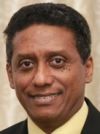 D. Faure |
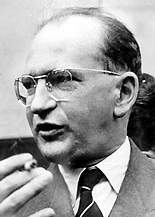 E. Faure |
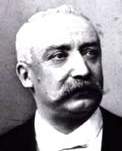 F. Faure |
Faure, Maurice (Louis Émile), dit Maurice-Faure (b. Jan. 7, 1850, Saillans, Drôme, France - d. Dec. 8, 1919, Saillans), French politician. He was president of the Radical Party (1903-04) and minister of education (1910-11).
Faure, Maurice (b. Jan. 2, 1922, Azerat, Dordogne, France - d. March 6, 2014, Cahors, Lot, France), interior minister of France (1958). He was also minister of European institutions (1958), justice (1981), and housing and equipment (1988-89) and president of the Radical Party (1961-65, 1969-71).
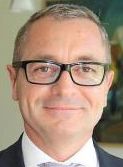 P. Faure |
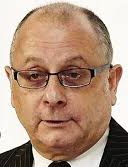 Faurie |
Fauzi, Gamawan (b. Nov. 9, 1957, Alahan Panjang, Sumatera Barat, Indonesia), governor of Sumatera Barat (2005-09) and home affairs minister of Indonesia (2009-14).
Favereau, Paul (Louis Marie Célestin) de (b. Jan. 15, 1856, Liége [now Liège], Belgium - d. Sept. 26, 1922, Durbuy, Belgium), foreign minister (1896-1907) and chairman of the Senate (1911-22) of Belgium.
Favon, Georges (b. Feb. 2, 1843, Plainpalais [now part of Geneva], Switzerland - d. May 17, 1902, Plainpalais), president of the National Council of Switzerland (1884) and president of the Council of State of Genève (1900-01).
Favreau, Benjamin (Marcel) (b. Jan. 17, 1915, Falleron, Vendée, France - d. Dec. 20, 1994, Paris, France), French resident commissioner of the New Hebrides (1958-60).
Fawcus, Sir (Robert) Peter (b. Sept. 30, 1915, Claygate, Surrey, England - d. April 22, 2003), commissioner of Bechuanaland (1963-65); knighted 1964.
Fawtier, Paul (Émile Joseph Casimir) (b. Oct. 22, 1837, Constantine, Algeria - d. March 10, 1903, Monrovia, Liberia), governor of French Guiana (1893).
Fawtier, William Maurice (Vincent Joseph Jean-Baptiste) (b. Dec. 22, 1867, Constantine, Algeria - d. July 26, 1926, Paris, France), governor of French Guiana (1909-10) and the French Settlements in Oceania (1913-15).
Fawwaz (ibn Abdul Aziz Al Saud) (b. 1934 - d. July 22, 2008, Paris, France), Saudi prince; son of Abdul Aziz. He was governor of Riyadh (1960-61) and Makkah (1971-79).
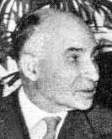 Mahmoud Fawzi |
Fawzi, Muhammad (b. 1915 - d. Feb. 16, 2000, Masr al-Jidida, Egypt), Egyptian politician. A 1936 graduate of Egypt's military academy, Fawzi first saw war in 1948 when Egypt fought the newly declared state of Israel. He commanded an artillery unit, and was wounded when a mine exploded under his vehicle. Egypt's Pres. Gamal Abdel Nasser named Fawzi commander of the army after the 1967 war, in which Israeli forces captured the Sinai peninsula from Egypt and secured a ceasefire from the Arab armies in just six days. Fawzi's No. 1 task was to rebuild and restore confidence in the shattered army. The next year, Nasser appointed Fawzi to the cabinet as defense minister, and he supervised the so-called war of attrition against Israeli forces along the Suez Canal. In 1971 Nasser's successor, Pres. Anwar as-Sadat, fired and arrested Fawzi, accusing him of taking part in a coup plot. Sadat later pardoned Fawzi. He joined the opposition Arab Nasserite Democratic Party and became a member of its political bureau.
Faxe, Arvid Gustaf (b. Aug. 18, 1799, Karlskrona, Blekinge, Sweden - d. April 23, 1882, Jönköping, Sweden), governor of Blekinge (1848-56) and Jönköping (1856-70).
Fayad Meneses, Omar (b. Aug. 26, 1962, Zempoala, Hidalgo, Mexico), governor of Hidalgo (2016-22). He was also mayor of Pachuca de Soto (2006-09).
Faye, Sheikh Omar (b. Jan. 10, 1960, Bathurst [now Banjul], Gambia), defense minister of The Gambia (2019-22). He was also minister of youth, sports, and religious affairs (2006-07) and chargé d'affaires (2014-15) and ambassador (2015-16) to the United States; in 2022 he was appointed ambassador to Mauritania. He was the Gambian team captain at the 1984 Summer Olympic Games.
Fayemi, (John) Kayode (b. Feb. 9, 1965, Isan Ekiti [now in Ekiti state], Nigeria), governor of Ekiti (2010-14, 2018-22). He was also Nigerian minister of solid minerals development (2015-18).
Fayet, Pierre, marquis de, seigneur de Peychaud (d. Aug. 11, 1737, Petit-Goave, Saint-Domingue [now Haiti]), governor-general of Saint-Domingue (1732-37).
Fayez, Akef (Mithqal) al- (b. 1924, Amman, Transjordan [now Jordan] - d. April 8, 1998), defense minister (1957-58, 1960-61) and interior minister (1969) of Jordan. He was also minister of agriculture (1957-60), construction and development (1957, 1958), social affairs (1959-60), public works (1963), communications (1963, 1967-68), and tourism and antiquities (1967), deputy prime minister (1969-70), and speaker of the House of Representatives (1963-66, 1984-88).
Fayez, Eid al- (b. 1945, Manja, Transjordan [now Jordan]), interior minister of Jordan (2005-09). He was also minister of labour (1999-2001) and youth and sports (2001-02).
Fayez, Faisal (Akef) al-, Arabic Faysal (`Akif) al-Fayyiz (b. April 22, 1952, Amman, Jordan), prime minister and defense minister of Jordan (2003-05); son of Akef al-Fayez. He has also been minister of the royal court (2003, 2005-07), speaker of the House of Representatives (2010-11), and president of the Senate (2015- ).
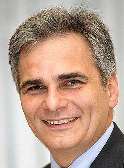 Faymann |
Fayolle, Philippe Athanase Hélène (b. April 22, 1772, Basse-Terre, Guadeloupe - d. 18...), commandant and administrator of Saint-Pierre and Miquelon (1819-25).
Fayose, (Peter) Ayo(dele) (b. Nov. 15, 1960, Ibadan [now in Oyo state], Nigeria), governor of Ekiti (2003-06, 2014-18). He was removed from office in 2006 after being declared guilty of corruption. The Economic and Financial Crimes Commission accused him of diverting $100,000 to a personal account in the U.S. and he was also accused of receiving kickbacks on a poultry project embarked upon by his state government.
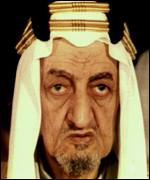 Faysal |
 Faysal I |
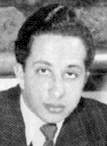 Faysal II |
Faysal ibn Abdullah (ibn Muhammad Al Saud) (b. May 13, 1950, Riyadh, Saudi Arabia), Saudi prince; son-in-law of King Abdullah. He was minister of education (2009-13).
Faysal ibn Bandar (ibn Abdul Aziz Al Saud) (b. 1943, Riyadh, Saudi Arabia), Saudi prince; grandson of Abdul Aziz. He has been governor of al-Qassim (1992-2015) and Riyadh (2015- ).
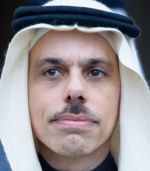 Faysal ibn F. |
Faysal ibn Khalid (ibn Abdul Aziz Al Saud) (b. 1954), Saudi prince; son of Khalid; grandson of Abdul Aziz. He was governor of Asir (2007-18).
Faysal ibn Nawwaf (ibn Abdul Aziz Al Saud) (b. September 1984), Saudi prince; son of Nawwaf; grandson of Abdul Aziz. He is governor of al-Jawf (2018- ).
Faysal ibn Salman (ibn Abdul Aziz Al Saud) (b. February 1970, Riyadh, Saudi Arabia), Saudi prince; son of Salman; grandson of Abdul Aziz. He is governor of Madinah (2013- ).
Faysal ibn Sattam (ibn Abdul Aziz Al Saud) (b. al-Ta´if, Saudi Arabia), Saudi prince; son of Sattam. He is ambassador to Italy (2017- ).
Faysal ibn Turki (ibn Abdul Aziz Al Saud), Saudi prince; grandson of Abdul Aziz. He was minister of labour and social affairs (1961) and interior (1961-62).
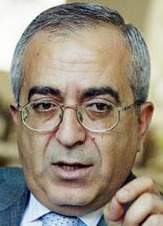 Fayyad |
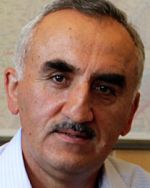 Fayzov |  Fazal |
Fazal, Mohammed (b. July 2, 1922, Allahabad [now Prayagraj], India - d. Sept. 4, 2014, Allahabad), governor of Goa (1999-2002, 2004) and Maharashtra (2002-04).
Fazekás, János (b. Feb. 15, 1926, Lupeni, Hunedoara county, Romania - d. March 6, 2004, Budapest, Hungary), a deputy premier of Romania (1965-82). He was also minister of food industry (1961-65) and internal trade (1974-80).
Fazekás, Ludovic (b. March 17, 1925, Oradea, Romania), a deputy prime minister of Romania (1982-89). He was also minister of forestry and building materials (1978-80).
Fazul, Mohamed Said (b. Sept. 18, 1960, Mohéli, Comoros), governor (2001-02, 2016- ) and president (2002-07) of Mohéli. He was named governor of Mohéli in March 2001. In November 2001, while on his way to Rabat via Cairo to attend a meeting of French-speaking mayors, he was the victim of mistaken identity. The Egyptian intelligence services mistook him for Fazul Abdullah Mohammed, a Comoran terrorist with links to al-Qaeda, who featured on the FBI's most wanted list. The Egyptians handed him to FBI agents at the American embassy, who proceeded to interrogate him. He was released the following morning after a traveling companion had sounded the alarm and the Americans had ascertained his true identity from the French embassy in Moroni. His incumbent position as island governor and the backing of Pres. Azali Assoumani helped him beat his rival, Mohamed Hassanaly, in the second round of the elections for the presidency of Mohéli on April 7, 2002, although Hassanaly had won more votes in the first round. In 2007 he was defeated by Mohamed Ali Said. In 2010 he ran unsuccessfully for the presidency of the Comoros. In 2016 he was again elected to the island leadership (although the title had reverted to governor), defeating Hadidja Aboubacar.
Fazy, (Georges Philippe) Henri (b. Jan. 31, 1842, Bern, Switzerland - d. Dec. 22, 1920, Geneva, Switzerland), president of the Council of State of Genève (1901-02, 1903-04, 1905-06, 1907-08, 1909-10, 1911-12, 1913-14, 1915-16, 1917-18); distant cousin of James Fazy.
Fazy, James, byname of Jean-Jacob Fazy (b. May 12, 1794, Geneva - d. Nov. 6, 1878, Petit-Saconnex [now part of Geneva]), president of the Council of State of Genève (1846-48, 1849-50, 1851-52, 1855-56, 1857-58, 1859-60) and president of the Council of States of Switzerland (1854).
Fazylov, Malyk (Sabirovich) (b. Aug. 15, 1927 - d. Oct. 17, 1995), foreign minister of the Kazakh S.S.R. (1973-76). He was also Soviet ambassador to Mali (1976-83) and Morocco (1983-90).
Fearey, Robert A(ppleton) (b. July 4, 1918 - d. Feb. 28, 2004, Washington, D.C.), civil administrator of Ryukyu (1969-72).
Febres Cordero, Esteban (b. Aug. 3, 1801, Maracaibo, New Granada [now in Venezuela] - d. Aug. 1, 1877, Guayaquil, Ecuador), foreign minister of Ecuador (1830).
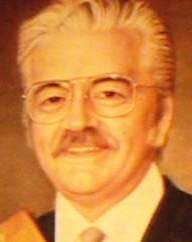 L. Febres C. |
Febvrier-Despointes, Auguste (b. April 29, 1796, Le Vauclin, Martinique - d. March 5, 1855, on board La Forte off Peru), commandant of New Caledonia (1853-54).
Fechner, Herbert (b. Aug. 27, 1913, Berlin - d. Dec. 28, 1998, Berlin), mayor of East Berlin (1967-74).
Federzoni, Luigi (b. Sept. 27, 1878, Bologna, Italy - d. Jan. 24, 1967, Rome, Italy), interior minister of Italy (1924-26). He was also minister of colonies (1922-24, 1926-28), president of the Senate (1929-39), and president of the Royal Academy of Italy (1938-43).
Fedini, Jean (b. Aug. 26, 1938), prefect of Guadeloupe (1996-99). He was also prefect of the départements of Aveyron (1993-96) and Drôme (1999-2000).
 Fedor |
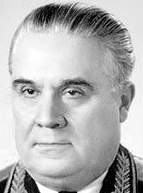 Fedorchuk |
Fedorenko, Nikolay (Trofimovich) (b. Nov. 9 [Oct. 27, O.S.], 1912, Pyatigorsk, Russia - d. Oct. 2, 2000, Moscow, Russia), Soviet diplomat. He was ambassador to Japan (1958-62) and permanent representative to the United Nations (1963-68).
Fedorishchev, Vyacheslav (Andreyevich) (b. July 14, 1989, Volgodonsk, Rostov oblast, Russian S.F.S.R.), chairman of the government of Tula oblast (2022- ).
 Fedoruk | 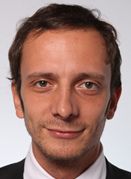 Fedriga |
Fedriga, Massimiliano (b. July 2, 1980, Verona, Italy), president of Friuli-Venezia Giulia (2018- ).
Feghabo(-Amain), Walter (Aye) (b. Dec. 10, 1957, Nembe area [now in Bayelsa state], Nigeria), administrator of Ebonyi (1996-98) and Delta (1998-99).
Feher, Lajos (b. Dec. 17, 1915, Szeghalom, Hungary - d. Nov. 1, 1981, Budapest, Hungary), a deputy premier of Hungary (1962-74).
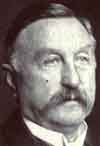 Fehrenbach |
Feierabend, Ladislav (Karel) (b. June 14, 1891, Adlerkosteletz, Austria [now Kostelec nad Orlicí, Czech Republic] - d. Aug. 15, 1969, Villach, Austria), finance minister of Czechoslovakia (in exile, 1941-45). He was also minister of agriculture (1938-40, from 1939 in Protectorate of Bohemia and Moravia) and justice and unification of laws (1938) and a minister of state (in exile, 1940-41).
Feif, Casten friherre (b. Sept. 29, 1662, Stockholm, Sweden - d. March 12, 1739, Stockholm), governor of Västmanland (1714-15). He was made friherre (baron) in 1715.
Feijó, Diogo Antonio (b. Aug. 3, 1784, São Paulo, Brazil - d. Nov. 9, 1843, São Paulo), principal minister (1832) and regent (1835-37) of Brazil. He was also justice minister (1831-32) and president of the Senate (1839-40).
Feillet, Paul (Théodore Ernest Marie) (b. April 4, 1857, Paris, France - d. Sept. 2, 1903, Montpellier, France), governor of Saint-Pierre and Miquelon (1891-94) and New Caledonia (1894-1902).
Feinzaig (Mintz), Eliécer, byname Eli Feinzaig (b. March 23, 1965, San José, Costa Rica), Costa Rican presidential candidate (2022).
Fejérváry de Komlós-Keresztes, Géza báró (b. March 15, 1833, Josefstadt, Austria [now part of Jaromer, Czech Republic] - d. April 25, 1914, Vienna, Austria), defense minister (1884-1903), prime minister (1905-06), and finance minister (1905-06) of Hungary. He was also acting minister a latere (1892, 1895) and acting minister of agriculture (1894).
Fekszi Horváth, Márta (b. Feb. 11, 1954, Pécs, Hungary), Hungarian diplomat. She was permanent representative to the United Nations (2010).
Fekter, Maria (Theresia) (b. Feb. 1, 1956, Attnang-Puchheim, Oberösterreich, Austria), interior minister (2008-11) and finance minister (2011-13) of Austria. She was also an ombudsman (2007-08).
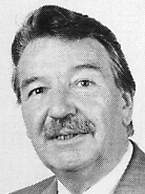 Felber | 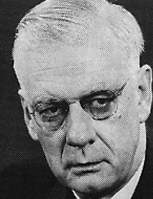 Feldmann |
Feldmann, Markus (b. May 21, 1897, Thun, Switzerland - d. Nov. 3, 1958, Bern, Switzerland), president of the Council of State of Bern (1947-48) and justice and police minister (1952-58) and president (1956) of Switzerland.
Feldt, Kjell-Olof (b. Aug. 18, 1931, Holmsund, Västerbotten, Sweden), finance minister of Sweden (1983-90). He was also minister of trade (1970-75) and budget (1982).
Felice, in full Felice Baciocchi, possibly originally Pasquale Baciocchi (b. May 18, 1762, Ajaccio, Corsica [now in France] - d. April 27, 1841, Bologna, Papal State [now in Italy]), prince of Lucca (1805-14) and duke of Massa and prince of Carrara (1806-14).
Felice, Giovanni (b. 1899 - d. 1977), finance minister of Malta (1962, 1966-71). He was also minister of justice (1953-55, 1962) and industrial development and tourism (1962-66).
Felice Cardot, Carlos (b. June 15, 1913, El Tocuyo, Lara state, Venezuela - d. Feb. 18, 1986, Caracas, Venezuela), foreign minister of Venezuela (1958). He was ambassador to Colombia in 1952-58.
Féliho, Jean Florentin (b. Nov. 24, 1932 - d. Dec. 3, 2010), interior minister (1990-91) and defense minister (1991-93) of Benin.
Felipe V, in full Felipe de Borbón y Baviera, Italian Filippo (IV), French Philippe, until 1700 Philippe, duc d'Anjou (b. Dec. 19, 1683, Versailles, France - d. July 9, 1746, Madrid, Spain), king of Spain (1700-24, 1724-46) and Naples and Sicily (1700-07) and duke of Luxembourg (1700-11); grandson of Louis XIV.
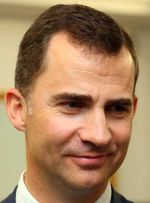 Felipe VI |
Feliú Manterola, Daniel (b. 1844, Valparaíso, Chile - d. July 6, 1923, Santiago, Chile), foreign minister of Chile (1918).
Félix Mena, Jorge (Humberto), defense minister of Ecuador (1988-92).
Félix Serna, Faustino (b. May 14, 1913, Pitiquito, Sonora, Mexico - d. April 17, 1986), governor of Sonora (1967-73).
Félix Trigo, Ciro (b. March 31, 1915, Tarija, Bolivia - d. Nov. 24, 1967, Asunción, Paraguay), interior and justice minister of Bolivia (1950). He was also minister of agriculture, livestock, and colonization (1950) and ambassador to Paraguay (1966-67).
Félix Valdés, Rodolfo (b. May 22, 1922, Nacozari, Sonora, Mexico - d. May 21, 2012, Mexico City, Mexico), governor of Sonora (1985-91). He was also Mexican minister of transport and communications (1982-84).
Felkerzam, Yegor (Fyodorovich), German Georg Friedrich von Fölkersahm (b. Nov. 10, 1766, Steinensee, Courland, Russia [now in Latvia] - d. Nov. 18, 1848, Riga, Russia [now in Latvia]), governor of Livonia (1829-47).
Fell, Richard (Taylor) (b. Nov. 11, 1948), governor of Pitcairn Island (2001-06). He was also British high commissioner to New Zealand (2001-06).
Felli, Roger (Joseph Atogetipoli) (b. May 2, 1941, Navrongo, Gold Coast [now Ghana] - d. [executed] June 26, 1979, near Accra, Ghana), foreign minister of Ghana (1975-79). He was also minister of works and housing (1972), trade and tourism (1972-74), and economic planning (1974-75).
Fellman Velarde, José (b. Sept. 19, 1922, La Paz, Bolivia - d. Jan. 21, 1982), foreign minister (1962-64) and interior minister (1964) of Bolivia. He was also minister of press and information (1952-56, 1958-60) and education (1960-62).
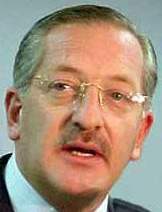 Fellner |
Fellowes, G(eorge) B(yron) L(yon), until 1856 George Byron Lyon (b. 1815, Sorel, Lower Canada [now Quebec] - d. March 14, 1876), mayor of Ottawa (1876).
Feltre, Henry (Jacques Guillaume) Clarke, duc de (b. Oct. 17, 1765, Landrecies [now in Nord département], France - d. Oct. 28, 1818, Neuwiller, Bas-Rhin, France), war minister of France (1807-14, 1815, 1815-17). He was created comte de Hunebourg in 1808 and duc de Feltre in 1809.
Fenech, Joe, byname of Joseph Fenech (b. April 2, 1931, Birkirkara, Malta - d. March 24, 2005, Attard, Malta), justice minister of Malta (1992-95).
Fenech, Tonio (b. May 5, 1969, Birkirkara, Malta), finance minister of Malta (2008-13).
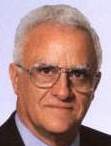 Fenech Adami |
Fénelon, François Louis de Salignac, marquis de (La Mothe-), baron de Loubert (b. Nov. 7, 1722 - d. April 1764, Antilles), governor of Martinique (1763-64).
 Feng Guozhang |
 Feng Zhian |
Fenger, Carl Emil (b. Feb. 9, 1814, Copenhagen, Denmark - d. Sept. 21, 1884, Copenhagen), finance minister of Denmark (1859, 1860-63, 1870-72).
Fenner, Arthur (b. Dec. 10, 1745, Providence, Rhode Island - d. Oct. 15, 1805, Providence), governor of Rhode Island (1790-1805).
Fenner, James (b. Jan. 22, 1771, Providence, Rhode Island - d. April 17, 1846, near Providence), governor of Rhode Island (1807-11, 1824-31, 1843-45); son of Arthur Fenner.
Fenner (Marín), Óscar (b. 1892, Purén, Chillán, Chile - d. Jan. 25, 1982, Las Condes, Santiago, Chile), foreign minister of Chile (1953). He was also minister of justice and education (1925), lands and colonization (1931), and economy and commerce (1953).
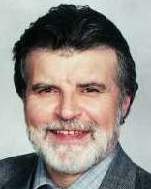 Fentie |
Feodosy, secular name Fyodor (Vasilyevich) Yankovsky (b. 1696, Vilnius, Lithuania - d. May 3 [April 22, O.S.], 1750, St. Petersburg, Russia), metropolitan of St. Petersburg (1745-50).
Feodosyev, Sergey (Grigoryevich) (b. July 30, 1880 - d. Oct. 4, 1937, Paris, France), Russian state comptroller (1916-17).
Feognost II, secular name Georgy (Ivanovich) Lebedev (b. 1829, Tver province, Russia - d. Feb. 4 [Jan. 22, O.S.], 1903, St. Petersburg, Russia), metropolitan of Kiev (1900-03). He was also bishop of Balta (1867-70), Astrakhan (1870-74), Podolia (1874-78), and Vladimir (1878-83) and archbishop of Vladimir (1883-92) and Novgorod (1892-1900).
Fera, Luigi (b. May 4, 1866, Cosenza, Italy - d. May 9, 1936, Rome, Italy), justice minister of Italy (1920-21). He was also minister of posts and telegraphs (1916-19).
Feraud Blum, Carlos (b. July 12, 1923, Guayaquil, Ecuador - d. Nov. 30, 1987, Guayaquil), interior minister of Ecuador (1980-81). He was also minister of labour (1979-80).
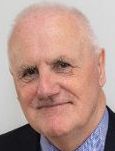 Ferbrache |
Ferdinand I, in full Ferdinand Karl Leopold Joseph Franz Marcellin, byname der Gütige (the Good), Czech Ferdinand Karel Leopold Josef Frantisek Marcellin "Dobrotivý," Hungarian Ferdinánd Károly Lipót József Ferenc Marcellin "Jóságos" (b. April 19, 1793, Vienna, Austria - d. June 29, 1875, Prague, Austria [now in Czech Republic]), king of Hungary (as Ferdinánd V) and archduke (as Ferdinand IV) and emperor of Austria (1835-48); son of Franz II.
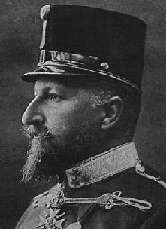 Ferdinand |
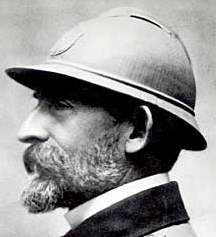 Ferdinand |
Ferdinando I, in full Ferdinando Antonio Pasquale Giovanni Nepomuceno Serafino Gennaro Benedetto (b. Jan. 12, 1751, Naples [Italy] - d. Jan. 4, 1825, Naples), king of Naples (as Ferdinando IV, 1759-99, 1799-1806), Sicily (as Ferdinando III, 1759-1816), and the Two Sicilies (1816-25); son of Carlos III.
Ferdinando II, in full Ferdinando Carlo (b. Jan. 12, 1810, Palermo, Sicily [Italy] - d. May 22, 1859, Caserta, Two Sicilies [Italy]), king of the Two Sicilies (1830-59); son of Francesco I.
Ferdinandy de Hidasnémet, Gyula (b. June 1, 1873, Kassa, Hungary [now Kosice, Slovakia] - d. Jan. 16, 1960, Szikszó, Hungary), justice minister (1920) and interior minister (1920-21) of Hungary.
 Ferey |
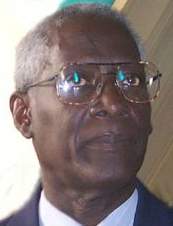 Fergus |
Ferguson, George Howard (b. June 18, 1870, Kemptville, Ont. - d. Feb. 21, 1946, Toronto, Ont.), premier of Ontario (1923-30). He was also high commissioner to the United Kingdom (1930-35).
Ferguson, James E(dward), byname Pa Ferguson (b. Aug. 31, 1871, near Salado, Bell county, Texas - d. Sept. 21, 1944, Austin, Texas), governor of Texas (1915-17). He was impeached, convicted, and barred from holding further state office, but ran for president in 1920 as the candidate of his own American Party.
Ferguson, Miriam A(manda), née Wallace, byname Ma Ferguson (b. June 13, 1875, Bell county, Texas - d. June 25, 1961, Austin, Texas), governor of Texas (1925-27, 1933-35); wife of James E. Ferguson.
Fergusson (of Kilkerran), Sir Charles, (7th) Baronet (b. Jan. 17, 1865, Edinburgh, Scotland - d. Feb. 20, 1951, Kilkerran, Ayrshire, Scotland), governor-general of New Zealand (1924-30); son of Sir James Fergusson. He succeeded his father as baronet in 1907 and was made K.C.M.G. in 1918 and G.C.M.G. in 1924.
 G. Fergusson |
Fergusson (of Kilkerran), Sir James, (6th) Baronet (b. March 18, 1832, Edinburgh, Scotland - d. [killed in earthquake] Jan. 14, 1907, Kingston, Jamaica), governor of South Australia (1869-72), New Zealand (1873-74), and Bombay (1880-85). He succeeded to the baronetcy in 1849 and was made K.C.M.G. in 1875. He was also British postmaster general (1891-92).
Fergusson, Robert G(eorge) (b. May 20, 1911 - d. Aug. 10, 2001), U.S. city commandant of Berlin (1967-70).
Ferizovic, Mersud (b. July 18, 1951, Bosanski Petrovac [now in Federation of Bosnia and Herzegovina]), premier of Una-Sana (1995-96).
Ferm, Anders (Jonny) (b. Feb. 20, 1938, Ockelbo, Gävleborg, Sweden - d. Oct. 1, 2019), Swedish diplomat. He was permanent representative to the United Nations (1982-88) and ambassador to Denmark (1988-90).
 Fermín |
Fernandes, George (Mathew) (b. June 3, 1930, Bangalore [now Bengaluru], India - d. Jan. 29, 2019, New Delhi, India), defense minister of India (1998-2001, 2001-04). A charismatic trade union leader best remembered for resisting emergency rule in 1975-76 (imprisoned in 1976-77), he was also minister of communications (1977), industries (1977-79), and railways (1989-90).
Fernandes, Gil Vicente Vaz (b. May 10, 1937, Bolama, Portuguese Guinea [now Guinea-Bissau]), Guinea-Bissauan diplomat. He was permanent representative to the United Nations and ambassador to the United States (1975-81).
Fernandes, João Cancio (b. Oct. 20, 1876 - d. Nov. 12, 1946, Rio de Janeiro, Brazil), acting governor of Acre (1923, 1926, 1926-27, 1930).
Fernandes, Raul (b. Oct. 24, 1877, Valença, Rio de Janeiro, Brazil - d. Jan. 6, 1968, Rio de Janeiro, Brazil), president of Rio de Janeiro (1922-23) and foreign minister of Brazil (1946-51, 1954-55). He was also ambassador to Belgium (1926-27).
 Alberto Fernández | 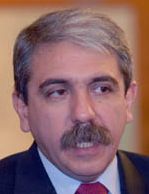 Aníbal Fernández |
Fernández, Aníbal (Domingo) (b. Jan. 9, 1957, Quilmes, Buenos Aires province, Argentina), production minister (2002-03), interior minister (2003-07), justice minister (2007-09), cabinet chief (2009-11, 2015), and security minister (2021- ) of Argentina.
Fernandez, Antonio Oladeinde (b. 1936, Lagos, Nigeria - d. Sept. 1, 2015, Brussels, Belgium), international diplomat. He was permanent representative of Mozambique (1984-89) and the Central African Republic (1997-2002) to the United Nations and ambassador-at-large for Togo (1992-95).
Fernández, Arístides (b. 1851 - d. Dec. 31, 1922, Bogotá, Colombia), war minister (1902-03) and interior minister (1903) of Colombia.
Fernández (Rodríguez), Belfor (b. Jan. 1, 1859, Cauquenes, Maule province, Chile - d. Oct. 4, 1936, Santiago, Chile), finance minister of Chile (1905-06, 1924). He was also minister of industry, public works, and railways (1912) and president of the Chamber of Deputies (1917-18).
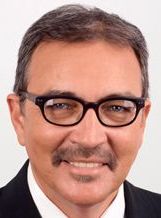 C. Fernandez | 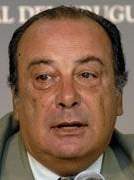 G. Fernández |  J.D. Fernández |
Fernández (Rojas), Emilio Ludovino (b. July 26, 1928, Maizal, Dominican Republic - d. Nov. 25, 1999, Santo Domingo, Dominican Republic), foreign minister of the Dominican Republic (1980-81).
Fernández (Domínguez), Gonzalo (Daniel) (b. March 21, 1952, Montevideo, Uruguay), foreign minister (2008-09) and defense minister (2009-10) of Uruguay.
Fernández (Mirabal), Jaime David (b. Oct. 15, 1956, Ojo de Agua, Salcedo province, Dominican Republic), vice president of the Dominican Republic (1996-2000). Like Pres. Leonel Fernández, he was a protégé of Juan Bosch. He later became minister of environment and natural resources (2008-11) and sports, physical education, and recreation (2012-16).
Fernández (González), Jaime Manuel (b. Sept. 4, 1920, La Vega Real, Dominican Republic - d. Sept. 6, 1988), foreign minister of the Dominican Republic (1970-72). He was also a presidential candidate (1970).
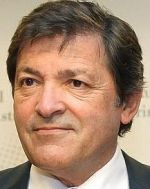 Javier Fernández |
Fernández, Jorge Sixto (b. 1922? - d. Aug. 7, 2000), governor of Mendoza (1976-80).
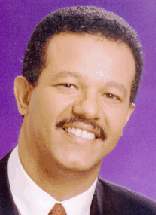 L. Fernández |
Fernández (Pradel), Manuel Salustio (b. June 1832, Concepción, Chile - d. 1914), finance minister of Chile (1890, 1894-95).
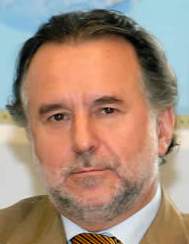 Mariano Fernández |
Fernández (Baeza), Mario (Adolfo del Carmen) (b. Nov. 22, 1947, Rancagua, Chile), defense minister (2000-02) and interior minister (2016-18) of Chile. He was also ambassador to Germany (2003-05), Austria (2014-15), and Uruguay (2015-16).
Fernández (Allende), Maya (Alejandra) (b. Sept. 27, 1971, Santiago, Chile), defense minister of Chile (2022- ); granddaughter of Salvador Allende; niece of Isabel Allende Bussi. She was also president of the Chamber of Deputies (2018-19).
Fernández (Medina), Orlando (José) (b. Jan. 4, 1946), governor of Lara (1995-2000).
Fernández, Roque (Benjamín) (b. April 30, 1947), economy minister of Argentina (1996-99). He was also president of the Central Bank of Argentina (1991-96).
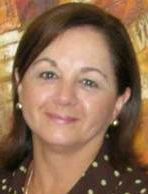 Rosario Fernández |
Fernandez, Samson (b. 1891 - d. March 10, 1971), Cambodian politician. He was minister of public health, social action, and labour (1953).
Fernández (Barriga), Santiago (b. June 23, 1775, Concepción, Chile - d. June 12, 1847, Concepción), acting war and marine minister of Chile (1823-24). He was also intendant of Concepción (1827).
Fernandez, Sosthène (b. Nov. 28, 1923, Pursat, Cambodia - d. July 11, 2006, Paris, France), Cambodian official; son of Samson Fernandez. He was secretary of state for national security (1968-70) and commander-in-chief of the armed forces (1972-75).
Fernández Aguirre, Braulio (b. Nov. 21, 1912, San Pedro de las Colonias, Coahuila, Mexico - d. Dec. 3, 2013, Torreón, Coahuila), governor of Coahuila (1963-69). He was also mayor of Torreón (1946, 1958-60).
Fernández Albano, Elías (b. 1845, Santiago, Chile - d. Sept. 6, 1910, Santiago), acting president of Chile (1910). He was also minister of industry and public works (1894-95, 1895-96), war and navy (1896-97), finance (1897), and interior (1899-1900, 1902-03, 1910).
Fernández Alonso (Caballero), Severo (b. Aug. 15, 1849, Sucre, Bolivia - d. Aug. 12, 1925, Cotagaita, Potosí department, Bolivia), war minister (1889-93, 1893-95), foreign minister (1892, 1922), vice president (1892-96), and president (1896-99) of Bolivia.
Fernández Álvarez, José Ramón, byname El Gallego (b. Nov. 4, 1923, Santiago de Cuba, Cuba - d. Jan. 6, 2019, Havana, Cuba), a vice premier of Cuba (1978-2012). He was also minister of education (1972-78, 1980-90).
Fernández Álvarez, Rafael Luis (b. Oct. 1, 1913, Oviedo, Spain - d. Dec. 18, 2010, Oviedo), president of the Regional Council (1978-82) and president (1982-83) of Asturias.
Fernández-Cuesta y Merelo, Raimundo (b. Oct. 5, 1896, Madrid, Spain - d. July 10, 1992, Madrid), justice minister of Spain (1945-51). He was also agriculture minister (1938-39) and ambassador to Brazil (1940-42) and Italy (1942-45).
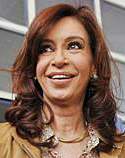 Fernández de K. |
Fernández de Soto, Absalón (b. 1891, Tulúa [now in Valle del Cauca], Colombia - d. 1964, Buga, Valle del Cauca), interior minister of Colombia (1934, 1945-46). He was also minister to El Salvador, Costa Rica, and Nicaragua (1937-38) and Italy (1947-48), minister of education (1942-43), governor of Valle del Cauca (1944-45, 1947, 1958-59), and ambassador to Argentina (1960-61).
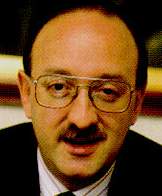 Fernández de S. |
Fernández Díaz, Jorge (b. April 6, 1950, Valladolid, Spain), interior minister of Spain (2011-16).
Fernández Durán, Gerardo (b. Oct. 27, 1921, San José, Costa Rica - d. Jan. 27, 2000, San José), foreign minister of Costa Rica (1949).
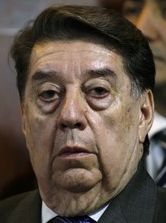 J.F. Fernández |
Fernández Faingold, Hugo (Tomás) (b. March 1, 1947), vice president of Uruguay (1998-2000). He was also minister of labour (1985-89) and ambassador to the United States (2000-05).
Fernández Fernández, Sergio (Ramiro) (b. Jan. 28, 1939, Punta Arenas, Chile), interior minister of Chile (1978-82, 1987-88). He was also minister of labour (1976-78).
Fernández Ferreira, Leopoldo (b. May 22, 1952, Cobija, Pando, Bolivia), interior minister of Bolivia (2001-02). He was also prefect of Pando (1997-99, 2006-08) and president of the Senate (1999-2001).
Fernández-Galiano (Fernández), Antonio (b. May 17, 1926, Barcelona, Spain - d. Nov. 8, 1999, Madrid, Spain), president of the Junta of Castilla-La Mancha (1979-82).
Fernández Jaén, Ezequiel (b. March 3, 1886, Penonomé, Colombia [now in Panama] - d. March 26, 1946, Panama City, Panama), finance minister and second vice president (1936-39) and acting president (1939) of Panama. He was also ambassador to Costa Rica (1941).
Fernández Lascoiti (y Fourquet), Victorio (b. Oct. 27, 1810, Oviedo, Spain - d. May 26, 1878, Madrid, Spain), finance minister of Spain (1863-64). He was also governor of the Bank of Spain (1866).
Fernández Maldonado Solari, Jorge (b. May 29, 1922, Ilo, Peru - d. Nov. 10, 2000), prime minister and war minister of Peru (1976). He was also minister of development and public works (1969) and energy and mines (1969-75).
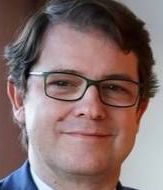 A. Fernández M. |
 T. Fernández-M. |
Fernández Ordóñez, Francisco (b. June 22, 1930, Madrid, Spain - d. Aug. 7, 1992, Madrid), finance minister (1977-79), justice minister (1980-81), and foreign minister (1985-92) of Spain.
Fernández Oreamuno, (Juan Primitivo) Próspero (b. July 18, 1834, San José, Costa Rica - d. March 12, 1885, Atenas, Alajuela province, Costa Rica), president of Costa Rica (1882-85); son of Manuel Fernández; brother-in-law of Tomás Guardia and José María Castro.
Fernández Prida, Joaquín (b. March 31, 1863, Oviedo, Spain - d. Nov. 29, 1942, Madrid, Spain), foreign minister of Spain (1922). He was also minister of justice (1917-18), interior (1919-20), and navy (1921).
 G. Fernández S. | 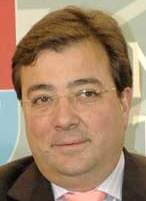 G. Fernández V. |
Fernández Sessarego, Carlos (b. March 7, 1926, Callao, Peru - d. July 28, 2019, Lima, Peru), justice minister of Peru (1965).
Fernández Stoll, Jorge (b. Dec. 31, 1911, Lima, Peru - d. 1991), interior minister of Peru (1956-58). He was also ambassador to West Germany (1958-60).
Fernández Valdivieso, Joffré (b. Dec. 7, 1927, Panao, Huánuco, Peru), justice minister of Peru (1990).
Fernández Vara, Guillermo (b. Oct. 6, 1958, Olivenza, Badajoz province, Extremadura, Spain), president of the Junta of Extremadura (2007-11, 2015- ).
Fernández Viagas, Plácido (b. March 29, 1924, Tangier, Morocco - d. 1983), president of the Junta of Andalucía (1978-79).
Fernández Viscarra, David, interior and justice minister of Bolivia (1968-69). He was also minister of energy and hydrocarbons (1978).
Fernández y Fernández, Joaquín (b. Oct. 24, 1891, Santiago, Chile - d. Sept. 9, 1979, Santiago), interior minister (1932), foreign minister (1942-46), and defense minister (1961) of Chile. He was also ambassador to Uruguay (1942) and France (1947-52).
Fernando II, in full Fernando Augusto Francisco António, German Ferdinand August Franz Anton Prinz von Sachsen-Coburg-Gotha (b. Oct. 29, 1816, Vienna, Austria - d. Dec. 15, 1885, Lisbon, Portugal), regent of Portugal (1853-55); husband of María II da Glória. He was made titular king as Fernando II in 1837.
Fernando VI, in full Fernando de Borbón y Saboya (b. Sept. 23, 1713, Madrid, Spain - d. Aug. 10, 1759, Villaviciosa de Odón, Spain), king of Spain (1746-59); son of Felipe V.
Fernando VII, in full Fernando María Francisco de Paula Domingo Vicente Ferrer Antonio José Joaquín Pascual Diego Juan Nepomuceno Genaro Francisco Francisco Javier Rafael Miguel Gabriel Calixto Cayetano Fausto Luis Ramón Gregorio Lorenzo Jerónimo de Borbón y Borbón-Parma (b. Oct. 14, 1784, El Escorial, Spain - d. Sept. 29, 1833, Madrid, Spain), king of Spain (1808, 1813-33); son of Carlos IV.
Fernando, Biyagamage J(ayasena) (b. Sept. 14, 1934), Sri Lankan diplomat. He was permanent representative to the United Nations (1978-80).
Fernando, (Maddumage Ebert) Lionel, governor of North Eastern province, Sri Lanka (1993-94). He was also ambassador to France (2009-10).
 T. Fernando |
Férolles, Pierre Eléonore de la Ville, marquis de (b. 16... - d. Aug. 5, 1705), governor of French Guiana (1691-1700, 1701-05).
Ferracciu, Nicolò (b. May 10, 1815, Calangianus, Kingdom of Sardinia [now in Sardegna, Italy] - d. March 2, 1892, Rome, Italy), justice minister of Italy (1884). He was also navy minister (1878-79).
Ferrão, José Carlos Mayrink da Silva (b. Dec. 5, 1771, Vila Rica [now Ouro Preto], Minas Gerais, Brazil - d. Jan. 15, 1846, Recife, Pernambuco, Brazil), president of Pernambuco (1824-26, 1827-28).
Ferrara, Aldo (b. Dec. 18, 1921, Serra San Bruno, Italy - d. Feb. 5, 1997), president of Calabria (1974-75, 1976-80). He was also mayor of Catanzaro (1980-82).
Ferrara, Maurizio (b. May 29, 1921, Rome, Italy - d. April 19, 2000, Rome), president of Lazio (1976-77).
Ferrari, Margaret Hughes (b. Jan. 1, 1948), Saint Vincent and the Grenadines diplomat. She was permanent representative to the United Nations (2001-07).
Ferrari, (Jean Désiré) Maxime (b. Jan. 27, 1930, Mahe island, Seychelles - d. June 29, 2021), foreign minister of Seychelles (1982-84). He was also minister of labour and social security (1975-77), agriculture and land use (1977-79), economic development and planning (1979-82), and economic planning (1982-84).
Ferrari Aggradi, Mario (b. March 13, 1916, La Maddalena, Sassari province, Italy - d. Dec. 24, 1997, Rome, Italy), finance minister (1968) and treasury minister (1970-72) of Italy. He was also minister of agriculture and forestry (1958-59, 1963-66, 1973-74), state investments (1959-60, 1972-73), transport (1960), posts and telecommunications (1968-69), education (1969-70), and public works (1972) and minister without portfolio (relations with parliament) (1970).
Ferraris, Luigi (b. March 6, 1813, Sostegno, France [now in Piemonte, Italy] - d. Oct. 17, 1900, Turin, Italy), interior minister (1869) and justice minister (1891) of Italy. He was also mayor of Turin (1878-82).
Ferraro, Carlos (Alfonso) (b. 1953), governor of Jujuy (1996-98).
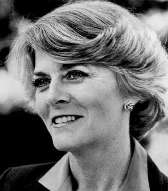 G. Ferraro |
Ferraz, Antônio Leôncio Pereira (b. Dec. 17, 1898 - d. January 1977), federal interventor in Piauí (1945).
Ferraz, Artur Ivens (b. Dec. 1, 1870, Lisbon, Portugal - d. Jan. 16, 1933, Lisbon), acting governor-general of Mozambique (1926) and prime minister of Portugal (1929-30). He was also minister of commerce and communications (1927-28), colonies (1928), and interior (1929-30).
Ferraz, Luiz Antonio (b. 1833, Rio de Janeiro, Brazil - d. Feb. 10, 1891, Pernambuco state, Brazil), governor of Ceará (1889-91).
Ferraz y Barrau, Valentín (b. 1793, Anciles [now in Huesca province], Spain - d. 1866, El Escorial, Spain), war minister (1840) and prime minister (1840) of Spain. He was also mayor of Madrid (1855-56).
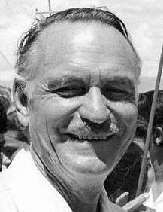 Ferré |
Ferreccio (Villamil), Horacio (b. Feb. 14, 1865, Lima, Peru - d. 1928, Paris, France), finance minister of Peru (1894).
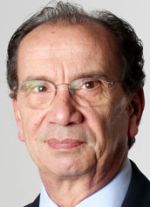 A.N. Ferreira |
Ferreira, Aluízio Pinheiro (b. May 12, 1897, Bragança, Pará, Brazil - d. Dec. 19?, 1980, Rio de Janeiro, Brazil), governor of Guaporé (1943-46).
Ferreira, Álvaro António da Costa (b. April 2, 1853, Luanda, Angola - d. Sept. 10, 1933, Lisbon, Portugal), governor-general of Angola (1893-96 and [acting] 1909).
Ferreira, Antonio Dias (b. Feb. 12, 1850, Santana de Macacu, Rio de Janeiro, Brazil - d. June 15, 1931, Rio de Janeiro, Brazil), acting prefect of Distrito Federal (1893).
Ferreira, Antonio Gonçalves (b. Sept. 26, 1846, Recife, Pernambuco, Brazil - d. Aug. 11, 1931, Rio de Janeiro, Brazil), president of Minas Gerais (1888-89), justice and interior minister of Brazil (1894-96), and governor of Pernambuco (1900-04).
Ferreira, António Vicente (b. April 30, 1874, Lisbon, Portugal - d. Jan. 29, 1953), high commissioner of Angola (1926-28). He was also Portuguese minister of finance (1912-13, 1921) and colonies (1923).
Ferreira, Cypriano da Costa (b. Aug. 31, 1861, Santana do Livramento, Rio Grande do Sul, Brazil - d. July 31, 1933, Porto Alegre, Rio Grande do Sul), federal interventor in Mato Grosso (1917).
Ferreira, Domingos Augusto, São Tomé and Príncipe diplomat. He was chargé d'affaires at the United Nations (1992-2006).
Ferreira, Elisa (Maria da Costa Guimarães) (b. Oct. 17, 1955, Porto, Portugal), Portuguese politician. She has been minister of environment (1995-99) and planning (1999-2002) and EU commissioner for cohesion and reforms (2019- ).
Ferreira, Felippe Nery (b. June 20, 1783, Recife, Pernambuco, Brazil - d. Sept. 2, 1834, Recife), president of Paraíba (1824).
Ferreira, Fernando Jorge Wahnon (b. Dec. 4, 1955, Praia, Cape Verde [now Cabo Verde]), Cabo Verdean diplomat. He was ambassador to Sweden (1999) and Belgium, the Netherlands, and Luxembourg (2000-10) and permanent representative to the United Nations (2014-16).
Ferreira, Fileto Pires (b. March 16, 1866, Piauí province [now state], Brazil - d. Aug. 11, 1917, Rio de Janeiro, Brazil), governor of Amazonas (1896-98).
Ferreira, Gabriel Luís (b. April 11, 1847, Valença, Piauí, Brazil - d. Dec. 15, 1895, Rio de Janeiro, Brazil), governor of Piauí (1891).
Ferreira, João Cândido (b. April 21, 1864, Lapa, Paraná, Brazil - d. Feb. 10, 1948, Curitiba, Paraná), acting president of Paraná (1906-07).
Ferreira, João Lopes, Filho (b. Aug. 10, 1854, Cascavel, Ceará, Brazil - d. May 1, 1928, Rio de Janeiro, Brazil), Brazilian politician. He was president of the Chamber of Deputies (1892-94).
Ferreira, João Luís (b. April 23, 1881, Teresina, Piauí, Brazil - d. July 8, 1927, Rio de Janeiro, Brazil), governor of Piauí (1920-24); son of Gabriel Luís Ferreira; brother of José Félix Alves Pacheco.
Ferreira, João Pedro da Silva (d. 1842), president of Sergipe (1840-41).
Ferreira, Joaquim Leal (b. Aug. 15, 1826, São Salvador da Bahia [now Salvador], Bahia, Brazil - d. Sept. 18, 1900, Santo Amaro da Purificação, Bahia), acting governor of Bahia (1891-92).
Ferreira, José Dias (b. Nov. 30, 1837, Aldeia Nova de Pombeiro, Coimbra district, Portugal - d. Sept. 8, 1909, Vidago, Portugal), prime minister of Portugal (1892-93). He was also minister of finance (1868, 1870, 1892-93), justice (1870), interior (1870, 1892-93), and public instruction (1892).
Ferreira, José Feliciano (b. Dec. 15, 1916, Jataí, Goiás, Brazil - d. March 23, 2009, Goiânia, Goiás), governor of Goiás (1959-61).
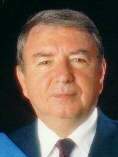 J.I. Ferreira |
Ferreira, José Jansen, Júnior (b. June 3, 1845, Caxias, Maranhão, Brazil - d. June 5, 1898, São Luís, Maranhão), president of Amazonas (1884-85) and Maranhão (acting, 1889).
Ferreira, José Joaquim Ramos (b. 1844, Pernambuco province [now state], Brazil - d. June 5, 1904, Rio de Janeiro, Brazil), acting president of Mato Grosso (1885, 1887).
Ferreira, José (Manuel) Medeiros (b. Feb. 20, 1942, São Miguel, Azores, Portugal - d. March 18, 2014, Lisbon, Portugal), foreign minister of Portugal (1976-77).
Ferreira, Manoel Antonio (b. June 15, 1805, Curitiba, São Paulo [now in Paraná], Brazil - d. Aug. 25, 1885, Curitiba), acting president of Paraná (1863).
Ferreira, Manoel Jansen (b. 1807, Maranhão captaincy [now state], Brazil - d. June 24, 1878, Belém, Pará, Brazil), acting president of Maranhão (1866, 1867, 1868).
Ferreira, Maria de Jesus dos Reis, Angolan diplomat. She has been ambassador to Austria, Croatia, Slovenia, and Slovakia (2011-18) and permanent representative to the United Nations (2018- ). In 2023 she was appointed ambassador to Portugal.
Ferreira, Mauro Mendes (b. April 12, 1964, Anápolis, Goiás, Brazil), governor of Mato Grosso (2019- ). He was also mayor of Cuiabá (2013-17).
Ferreira, Pedro Affonso (b. June 1836, Cabo de Santo Agostinho, Pernambuco, Brazil - d. Sept. 2, 1897, Recife, Pernambuco), president of Piauí (1872-73) and Santa Catarina (1873); son-in-law of José Maria da Silva Paranhos, visconde do Rio Branco.
Ferreira, Roberto (b. Sept. 30, 1834, Maceió, Alagoas, Brazil - d. March 6, 1915, Rio de Janeiro, Brazil), member of the Governing Junta of Paraná (1891-92).
Ferreira, Severino José Cavalcanti (b. Dec. 18, 1930, João Alfredo, Pernambuco, Brazil - d. July 15, 2020, Recife, Pernambuco), Brazilian politician. He was president of the Chamber of Deputies (2005).
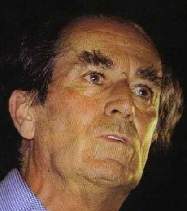 W. Ferreira |
Ferreira do Amaral, João Maria (b. March 4, 1803, Lisbon, Portugal - d. [assassinated] Aug. 22, 1849, Macau), governor of Macau (1846-49).
Ferrer, Aldo (b. April 15, 1927, Buenos Aires, Argentina - d. March 8, 2016, Buenos Aires), economy minister of Argentina (1970-71). He was also ambassador to France (2011-13).
 Ferrer (L.) |
Ferrer Cafranga, Joaquín María (b. Dec. 7, 1777, Pasajes, Guipúzcoa province, Spain - d. Sept. 30, 1861, Santa Águeda, Mondragón, Guipúzcoa province), finance minister (1836, 1841), foreign minister (1840-41), and prime minister (1841) of Spain. He was also president of the Cortes (1823) and the Congress of Deputies (1837).
Ferreri, Pietro (b. Jan. 9, 1758, Alassio, Italy - d. 18...), member of the Executive Directory of the Ligurian Republic (1798-99).
Ferrero, Emilio, acting foreign minister of Colombia (1917). He was also minister of education (1914-18).
Ferrero Costa, Augusto (b. Nov. 3, 1944, Lima, Peru), Peruvian diplomat; son of Raúl Ferrero Rebagliati. He was ambassador to Italy (2009-10).
 C. Ferrero |  E. Ferrero |
Ferrero Costa, Eduardo (José) (b. Oct. 26, 1946, Lima, Peru), foreign minister of Peru (1997-98); brother of Carlos Ferrero Costa; nephew of Raúl Ferrero Rebagliati and Romulo Ferrero Rebagliati. He was also permanent representative to the OAS (2001-04) and ambassador to the United States (2004-06).
Ferrero Rebagliati, Raúl (Ernesto) (b. Sept. 20, 1911, Barranco, Peru - d. April 22, 1977, Lima, Peru), prime minister and foreign minister (1967-68) and finance minister (1968) of Peru; brother of Rómulo Ferrero Rebagliati.
Ferrero Rebagliati, Rómulo (Augusto) (b. April 28, 1907, Lima, Peru - d. Aug. 1, 1975, Lima), finance minister of Peru (1945, 1948). He was also agriculture minister (1948).
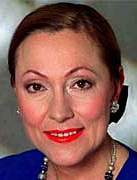 Ferrero-Waldner |
Ferreyros (Senra), (José) Guillermo (Pablo) (b. Jan. 15, 1841, Lima, Peru - d. Nov. 26, 1914, Lima), war and navy minister (1889-90) and interior, police, and public works minister (1890, 1894) of Peru; son of Manuel Ferreyros (de la Mata); brother of Manuel Ferreyros (Senra).
Ferreyros (de la Mata), Manuel (Bartolomé) (b. Aug. 24, 1793, Lima, Peru - d. Sept. 24, 1872, Lima), foreign and interior minister (1835-36 [Salaverry government], 1839-41, 1849-51) and finance minister (1838, 1839-40) of Peru.
Ferreyros (Senra), Manuel (José) (b. Sept. 2, 1833, Lima, Peru - d. Jan. 13, 1876, Puno, Peru), interior, police, and public works minister of Peru (1869); son of the above.
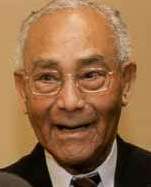 Ferrier |
Ferriez, François (Aimé Marie Edmond) (b. Sept. 9, 1834, Fort-de-France, Martinique - d. ...), acting commandant-superior of Mayotte (1875) and commandant of Nossi-Bé (1876-78) and Mayotte (1879-85).
Ferrouillat, Jean-Baptiste, dit Joannis Ferrouillat (b. May 4, 1820, Lyon, France - d. March 24, 1903, Montpellier, Hérault, France), justice (and worship) minister of France (1888-89).
Ferrufino Valderrama, Alfonso (b. March 30, 1942, Cochabamba, Bolivia), interior minister of Bolivia (2003-04).
Ferry, Charles (Émile Joseph Léon) (b. May 23, 1834, Saint-Dié [now Saint-Dié-des-Vosges], Vosges, France - d. July 21, 1909, Paris, France), French politician; brother of Jules Ferry. He was prefect of the départements of Saône-et-Loire (1871) and Haute-Garonne (1871-73).
 J. Ferry |
Fersen, Reinhold Johan friherre von (b. af. 1651 - d. Dec. 10, 1716, Stockholm, Sweden), governor of Halland (1705-10). He was raised from friherre (baron) to greve (count) in 1712.
 Ferson | 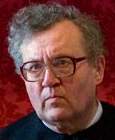 Festing |
Feruta, Cornel (b. Aug. 21, 1975, Bals, Olt, Romania), Romanian diplomat. He has been acting director-general of the International Atomic Energy Agency (2019) and permanent representative to the United Nations (2022- ).
Fessenden, William P(itt) (b. Oct. 16, 1806, Boscawen, N.H. - d. Sept. 8, 1869, Portland, Maine), U.S. treasury secretary (1864-65). He was also a representative (1841-43) and senator (1854-64, 1865-69) from Maine.
Festetics de Tolna, Andor gróf (b. Jan. 17, 1843, Pest [now part of Budapest], Hungary - d. Aug. 16, 1930, Böhönye, Somogy county, Hungary), Hungarian politician. He was agriculture minister (1894-95).
Festetics de Tolna, Sándor (Ágost Dénes) gróf (b. May 31, 1882, Dég, Veszprém county, Hungary - d. Sept. 12, 1956, Balatonrendes, Zala [now in Veszprém] county, Hungary), defense minister of Hungary (1918-19); son of Andor gróf Festetics de Tolna.
Festing, (Robert) Matthew (b. Nov. 30, 1949, Northumberland, England - d. Nov. 12, 2021, Malta), grand master of the Sovereign Military Order of Malta (2008-17).
Feutray, Arthur Paul (b. June 21, 1829, Lorient, Morbihan, France - d. ...), commandant of Nossi-Bé (1876).
Feyder, Jean (b. Nov. 24, 1947), Luxembourg diplomat. He was permanent representative to the United Nations (1987-92).
 Feyide |
Fiaes, Luiz Paulo de Araujo Bastos, barão e visconde dos (b. Jan. 3, 1797, Rio de Janeiro, Brazil - d. July 27, 1863, Salvador, Bahia, Brazil), president of Bahia (1830-31). He was made baron in 1841 and viscount in 1854.
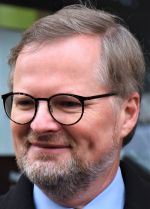 Fiala |
Fialho, Vicente Cavalcante (b. Jan. 27, 1938, Tauá, Ceará, Brazil), Brazilian politician. He was mayor of São Luís (1969-70) and Fortaleza (1971-75) and minister of irrigation (1986-88) and mines and energy (1989-90).
Fialin, (Jean-Gilbert) Victor, duc de Persigny (b. Jan. 11, 1808, Saint-Germain-Lespinasse, Loire, France - d. Jan. 12, 1872, Nice, Alpes-Maritimes, France), interior minister of France (1852-54, 1860-63). He was also ambassador to the United Kingdom (1855-58, 1859-60). He took the title vicomte de Persigny in 1832, then became comte in 1852 and duc in 1863.
Fiallos Navarro, Francisco (José) (b. Feb. 20, 1946, Matagalpa, Nicaragua), interior minister of Nicaragua (2006-07); grandson of Francisco Navarro. He was also ambassador to Canada (1981-82), the United States (1982), the Vatican (1991-94), and Costa Rica (2003-06) and attorney general (2002-03).
Fibiger, Jakob Scavenius (b. Jan. 25, 1793, Erritsø sogn, Denmark - d. Oct. 11, 1861, Copenhagen, Denmark), war minister of Denmark (1851).
Ficardo, Muhammad Ridho (b. July 20, 1980, Bandar Lampung, Lampung, Indonesia), governor of Lampung (2014-19).
Fichev, Ivan (Ivanov) (b. April 15, 1860, Turnovo, Ottoman Empire [now Veliko Turnovo, Bulgaria] - d. Nov. 18, 1931, Sofia, Bulgaria), war minister of Bulgaria (1914-15). He was also army chief of staff (1910-14).
Fico, Rauf Bej (b. March 13, 1881, Sana, Yemen - d. Jan. 23, 1944, Tiranë, Albania), foreign minister of Albania (1929-31). He was also prefect of Shkodër (1922-23) and minister to Turkey and Bulgaria (1926-28), Yugoslavia (1928-29, 1932-37), Greece (1937-38), and Germany (1938-39).
 Robert Fico |
Ficoseco, (José) Carlos (b. Sept. 28, 1954, Jujuy, Argentina), governor of Jujuy (1993-94).
Ficquelmont, Karl Ludwig Graf von (b. March 23, 1777, Dieuze, near Nancy, France - d. April 7, 1857, Venice, Austria [now in Italy]), acting foreign minister (1848) and acting prime minister (1848) of Austria; grandson-in-law of Knyaz Mikhail Golenishchev-Kutuzov-Smolensky. He was also minister to Sweden (1815-20), Tuscany (1820-21), and the Two Sicilies (1821-28) and ambassador to Russia (1829-40).
Fieandt, Erik Johan von (b. March 1, 1762 - d. Aug. 16, 1810, Stockholm, Sweden), acting governor of Savolax och Karelen (1803).
Fieandt, (Berndt) Rainer von (b. Dec. 26, 1890, Turku, Finland - d. April 28, 1972, Helsinki, Finland), prime minister of Finland (1957-58); great-grandson of cousin of Erik Johan von Fieandt. He was also minister of supply (1939-40) and governor of the Bank of Finland (1955-57).
Field-Ridley, Shirley (Merle) (b. Aug. 24, 1937, Georgetown, British Guiana [now Guyana] - d. June 26, 1982, Georgetown), Guyanese politician; wife (from 1970) of Hamilton Green; former wife of P.J. Patterson. She was minister of education (1969-71), health (1971-72), and information (1972-79).
 Fielding |
Fierlinger, Zdenek (b. July 11, 1891, Olomouc, Austria [now in Czech Republic] - d. May 2, 1976, Prague, Czechoslovakia [now in Czech Republic]), prime minister of Czechoslovakia (1945-46). He was also minister to the Netherlands (1921-24), Romania (1924-25), the United States (1925-28), Switzerland (1928-32), and Austria (1932-36), minister (1937-39, 1941-42) and ambassador (1942-45) to the Soviet Union, a deputy premier (1946-47, 1948-53), minister of industry (1948), and chairman of the National Assembly (1953-64).
Fierro (Pérez de Camino), Alejandro (b. 1831, Santiago, Chile - d. June 6, 1927, Santiago), foreign minister of Chile (1878-79). He was also intendant of Santiago (1883-86) and Tacna (1886-89), minister to Brazil (1890-91), and minister of justice and education (1904).
Fifield, Mitch(ell Peter) (b. Jan. 16, 1967, Sydney, N.S.W.), Australian politician. He has been minister of communications and arts (2015-19) and permanent representative to the United Nations (2019- ).
Fifor, Mihai(-Viorel) (b. May 10, 1970, Turnu Severin [now Drobeta-Turnu Severin], Romania), defense minister (2017-18) and interim prime minister (2018) of Romania.
Figallo (Rivadeneyra), Daniel (Augusto) (b. June 12, 1961, Miraflores, Lima province, Peru), justice minister of Peru (2013-15).
Fige, Karl (Yakovlevich), Latvian Karlis Fige (b. 1897 - d. [executed] June 22, 1938, Chita, Russian S.F.S.R.), executive secretary of the Communist Party committee of the Tatar A.S.S.R. (1921). He was also chairman of the party committee of Vitebsk province (1919), mayor of Vitebsk (1919-20), chairman of the Revolutionary Committee of Kazan province (1920), and acting executive secretary of the party committee of Kostroma province (1923).
Figel, Ján (b. Jan. 20, 1960, Vranov nad Toplou, Czechoslovakia [now in Slovakia]), a deputy prime minister of Slovakia (2010-12). He was also minister of transport, construction, and regional development (2010-12) and EU commissioner for enterprise and information society (jointly with Erkki Liikanen, 2004), education, training, culture, and multilingualism (2004-06), and education, training, culture, and youth (2007-09).
Figelsky, Vladislav (Damianovich) (b. June 6, 1889, Plock, Poland - d. [executed] Jan. 19, 1919, Tashkent, Russia [now in Uzbekistan]), chairman of the Council of People's Commissars of the Turkestan S.F.R. (1918-19).
Figgures, Sir Frank E(dward) (b. March 5, 1910, Merton, London, England - d. Nov. 27, 1990, Glaston, Rutland, England), secretary-general of EFTA (1960-65); knighted 1970.
Figir, Vincent A. (b. March 1, 1936), governor of Yap (1995-2003).
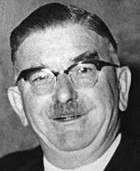 Figl |
Fignolé, (Pierre Eustache) Daniel (b. 1914, Pestel, Haiti - d. Aug. 27, 1986, Port-au-Prince, Haiti), provisional president of Haiti (1957). He was also education and health minister (1946).
Figueira, Antonio Tiburcio (d. 1898), president of Alagoas (1884-85) and Maranhão (1885).
Figueira, Domingos de Andrade (b. Oct. 6, 1833, Itaguaí, Rio de Janeiro, Brazil - d. Aug. 14, 1910, Rio de Janeiro, Brazil), president of Minas Gerais (1868-69). He was also president of the Chamber of Deputies of Brazil (1886-87).
Figueira, Frederico (Pereira) de Sá (b. Dec. 10, 1849, Picos [now Colinas], Maranhão, Brazil - d. July 8, 1924, Barra do Corda, Maranhão), president of Maranhão (1910).
Figueira, Manuel Pereira, acting governor-general of Angola (1943).
Figueiredo, Antonio Leite de (b. Dec. 10, 1853, Nossa Senhora do Livramento, Mato Grosso, Brazil - d. Sept. 19, 1914, Cuiabá, Mato Grosso), president of Mato Grosso (1899).
Figueiredo, Argemiro de (b. March 9, 1901, Campina Grande, Paraíba, Brazil - d. Dec. 14, 1982, Campina Grande), governor/federal interventor in Paraíba (1935-40).
Figueiredo, Bento (b. Dec. 13, 1904, Campina Grande, Paraíba, Brazil - d. May 27, 1981, Campina Grande), Brazilian politician; brother of Argemiro de Figueiredo. He was mayor of Campina Grande (1935 [acting], 1938-40).
Figueiredo, Arnaldo Estêvão de (b. Aug. 18, 1892, Brotas [then part of Cuiabá; now part of Rosário Oeste], Mato Grosso, Brazil - d. Dec. 15, 1991, Campo Grande, Mato Grosso do Sul, Brazil), governor of Mato Grosso (1947-50). He was also mayor of Campo Grande (1920-21, 1924-26).
Figueiredo, Caetano de Brito e (baptized Jan. 4, 1671, Lisbon, Portugal - d. Oct. 17, 1732, Lisbon), member of the Provisional Government Junta of Brazil (1719-20).
Figueiredo, Carlos Afonso de Assis (b. 1845, Ouro Preto, Minas Gerais, Brazil - d. April 5, 1907, Rio de Janeiro, Brazil), war minister of Brazil (1882-83) and president of Rio de Janeiro (1889); brother of Afonso Celso de Assis Figueiredo, visconde de Ouro Preto.
Figueiredo, Carlos Augusto de Oliveira (b. Nov. 4, 1837, Rio de Janeiro, Brazil - d. Oct. 29, 1912, Rio de Janeiro), president of Minas Gerais (1887).
Figueiredo, Elísio (Ávila) de (Jesús) (b. June 13, 1940), Angolan diplomat. He was permanent representative to the United Nations (1976-88) and ambassador to the United Kingdom (1988-89), France (1989-92), and Singapore and Indonesia (2002-06).
Figueiredo, João Baptista de, acting president of Minas Gerais (1834).
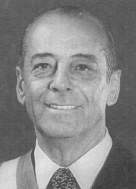 J.B.O. Figueiredo |
Figueiredo, João Kubitschek de (b. 1898?, Diamantina, Minas Gerais, Brazil - d. Jan. 25, 1986, Belo Horizonte, Minas Gerais), governor of Acre (1952-53).
Figueiredo, José Bento da Cunha, Júnior (b. Nov. 29, 1833, Recife, Pernambuco, Brazil - d. Aug. 3, 1885, Lorena, São Paulo, Brazil), president of Rio Grande do Norte (1860-61), Ceará (1862-64), Alagoas (1868-71), and Maranhão (1872-73); son of José Bento da Cunha Figueiredo, visconde do Bom Conselho.
Figueiredo, José Eliton de, Júnior, also spelled Figuêredo (b. Aug. 27, 1972, Rio Verde, Goiás, Brazil), governor of Goiás (2018-19).
Figueiredo, José Paulino de, acting president of Paraíba (1877, 1878).
Figueiredo, Lourenço Valente de (b. c. 1840, Oeiras, Piauí, Brazil - d. Dec. 4, 1921, Rio de Janeiro, Brazil), president of Piauí (1889).
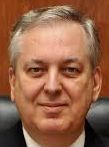 L.A. Figueiredo |
Figueiredo, Manoel Bernardino de Souza (b. 1790? - d. March 7, 1857), acting president of Maranhão (1844).
Figueiredo, Maria Dalva de Souza (b. April 25, 1961, Clevelândia do Norte, Oiapoque municipality, Amapá, Brazil), governor of Amapá (2002-03).
Figueiró, Luís de Vasconcellos e Sousa, conde de (b. Nov. 1, 1742, Lisbon, Portugal - d. March 24, 1809, Rio de Janeiro, Brazil), viceroy of Brazil (1779-90). He was created conde de Figueiró in 1808.
Figueredo (Planchart), Reinaldo (b. June 23, 1938, Caracas, Venezuela), foreign minister of Venezuela (1989-91).
Figueres Boggs (de Jiménez), Muni, byname of Meta Shanon Figueres Boggs (b. Feb. 19, 1945, San José, Costa Rica), Costa Rican politician; daughter of José Figueres Ferrer. She was minister of foreign trade (1986-88) and ambassador to the United States (2010-14).
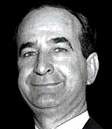 J. Figueres |
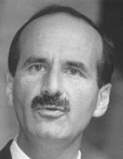 J.M. Figueres |
Figueroa (Figueroa), Rufo (b. 1906, Huitzuco, Guerrero, Mexico - d. June 25, 1967, Mexico City, Mexico), governor of Quintana Roo (1964-67).
Figueroa Alcocer, Rubén (b. Dec. 4, 1939, Huitzuco, Guerrero, Mexico), governor of Guerrero (1993-96); son of Rubén Figueroa Figueroa.
Figueroa Alcorta, José (María Cornelio) (b. Nov. 20, 1860, Córdoba, Argentina - d. Dec. 27, 1931, Buenos Aires, Argentina), president of Argentina (1906-10). He was also governor of Córdoba (1895-98) and vice president (1904-06).
Figueroa Anguita, Hernán (Alfonso) (b. Feb. 24, 1897, Traiguén, Chile - d. Feb. 8, 1985, Santiago, Chile), interior minister of Chile (1945, not taking office). He was also ambassador to Spain (1940-45).
Figueroa Figueroa, Rubén (b. Nov. 9, 1908, Huitzuco, Guerrero, Mexico - d. March 18, 1991, Mexico City, Mexico), governor of Guerrero (1975-81); brother of Rufo Figueroa.
Figueroa Geisse, Eduardo (b. Feb. 11, 1916, Santiago, Chile - d. Dec. 2, 2000, Santiago), finance minister of Chile (1960-61). He was also president of the Central Bank (1959-62).
Figueroa Larraín, Emiliano (b. July 12, 1866, Santiago, Chile - d. [automobile accident] May 16, 1931, Laguna de Aculeo, Chile), president of Chile (1910 [acting], 1925-27); brother of Javier Ángel Figueroa Larraín and Joaquín Figueroa Larraín. He was also justice and education minister (1907, 1909-10).
Figueroa Larraín, Javier Ángel (b. Jan. 17, 1862, Santiago, Chile - d. June 26, 1945, Santiago), war and marine minister (1899) and interior minister (1906, 1908-09) of Chile. He was also minister of justice and education (1905) and president of the Supreme Court (1925-27, 1931-32).
Figueroa Larraín, Joaquín (b. 1863, Santiago, Chile - d. May 30, 1929, Santiago), foreign minister of Chile (1912). He was also minister of industry (1907-08) and finance (1909).
Figueroa Oreamuno, Eusebio (b. May 18, 1827, Cartago, Costa Rica - d. [killed in duel] Aug. 11, 1883, San José, Costa Rica), interior minister (1868-69) and foreign minister (1883) of Costa Rica. He was also minister to El Salvador (1863), first designate (1869-70), and president of the Supreme Court (1876-78).
Figueroa Serrano, Carlos (b. Nov. 28, 1930, Angol, Chile), economy minister (1969-70), foreign minister (1994), and interior minister (1994-98) of Chile. He was also ambassador to Argentina (1990-93).
Figueroa Zamudio, Jaime Genovevo (b. April 26, 1940, Cuitzeo del Porvenir, Michoacán, Mexico), governor of Michoacán (1988-92). He was also Mexican ambassador to Argentina (1999-2001).
Figuerola (de Estrada), Justo (Modesto) (b. April 18, 1771, Lambayeque, Peru - d. May 23, 1854, Lima, Peru), foreign and interior minister (1828-29) and acting president (1843, 1844) of Peru. He was also president of the Constituent Congress (1823) and of the Supreme Court (1836-37).
Figuerola Ballester, Laureano (b. July 4, 1816, Calaf, Barcelona province, Spain - d. Feb. 28, 1903, Madrid, Spain), finance minister of Spain (1868-69, 1869-70). He was also president of the Senate (1872-73).
Figures, Sir Colin (Frederick) (b. July 1, 1925, Birmingham, England - d. Dec. 8, 2006), director-general of the Secret Intelligence Service (1982-85); knighted 1983.
Fikini, Mohieddin, also spelled Mohieddine Fekini (b. March 10, 1925, Sebha, Fezzan [now in Libya] - d. July 9, 1994), prime minister and foreign minister of Libya (1963-64). He was also head of the Executive Council of Tripolitania (1954), justice minister (1956-57), ambassador to Egypt (1957-58) and the United States (1958-63), and permanent representative to the United Nations (1959-63).
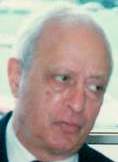 Filali |
Filaret, secular name Vasily (Mikhailovich) Drozdov (b. Jan. 6, 1783 [Dec. 26, 1782, O.S.], Kolomna, Russia - d. Dec. 1 [Nov. 19, O.S.], 1867, Moscow, Russia), metropolitan of Moscow (1821-67). He was also bishop of Revel (1817-19) and archbishop of Tver (1819-21).
Filaret, English Philaret, secular name Georgy (Nikolayevich) Voznesensky (b. April 4 [March 22, O.S.], 1903, Kursk, Russia - d. Nov. 21, 1985, New York City), metropolitan of the Russian Orthodox Church Outside Russia (1964-85). He was also bishop of Brisbane (1963-64).
Filaret I, secular name Fyodor (Georgiyevich) Amfiteatrov (b. April 28 [April 17, O.S.], 1779, Vysokoye village, Oryol province, Russia - d. Jan. 2, 1858 [Dec. 21, 1857, O.S.], Kiev, Russia [now in Ukraine]), metropolitan of Kiev (1837-58). He was also bishop of Kaluga (1819-25) and Ryazan (1825-26) and archbishop of Ryazan (1826-28), Kazan (1828-36), and Yaroslavl (1836-37).
Filaret II, secular name Mikhail (Antonovich) Denisenko (b. Jan. 28, 1929, Blagodatnoye, Donetsk oblast, Ukrainian S.S.R.), metropolitan of Kiev (1966-92). He was also bishop of Luga (1962), Vienna (1962-64), and Dmitrov (1964-66).
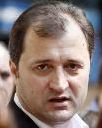 Filat | 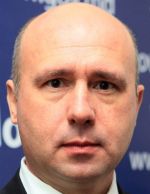 Filip |
Filatov, Kuzma (Filippovich) (b. July 14, 1929, Nottovarakka, Karelian A.S.S.R., Russian S.F.S.R. - d. May 5, 2008, Petrozavodsk, Karelia, Russia), chairman of the Presidium of the Supreme Soviet of the Karelian A.S.S.R. (1986-89). He was also first deputy premier (1984-86).
Filbinger, Hans (Karl) (b. Sept. 15, 1913, Mannheim, Germany - d. April 1, 2007, Freiburg im Breisgau, Germany), minister-president of Baden-Württemberg (1966-78).
Filgueiras, Caetano Alves de Souza (b. June 22, 1830, São Salvador da Bahia [now Salvador], Bahia, Brazil - d. July 28, 1882, Paraíba [now João Pessoa], Paraíba, Brazil), president of Goiás (1862).
Filip, Pavel (b. April 10, 1966, Panasesti, Moldavian S.S.R.), prime minister of Moldova (2016-19). He was also minister of information technology and communications (2011-16).
Filipas, Cornelia (b. Aug. 26, 1926, Chiochis, Bistrita-Nasaud county, Romania), a deputy prime minister of Romania (1980-82). She was also ambassador to Denmark and Iceland (1985-89).
Filipenko, Aleksandr (Vasilyevich) (b. May 31, 1950, Kazakh S.S.R.), chairman of the Executive Committee (1989-91), head of the administration (1991-96), and governor (1996-2010) of Khanty-Mansi autonomous okrug.
Filipescu, Nicolae (b. Dec. 5, 1862, Bucharest, Romania - d. Sept. 30, 1916, Bucharest), war minister of Romania (1910-12). He was also mayor of Bucharest (1893-95 and [acting] 1899).
Filipo, Vaovasamanaia, also known as Reginald Paul Phillips (b. 1924? - d. September 1993), finance minister of Western Samoa (1976-82). He was also minister of agriculture (1975-76), chief justice (1983-86), and ombudsman (1993).
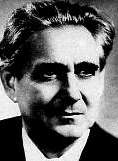 Filipov |
Filipovic, Karlo (b. July 10, 1954, Solakovici, Ilijas municipality, Bosnia and Herzegovina), president of the Federation of Bosnia and Herzegovina (2001-02). He was vice president in 2002-03.
Filipowicz, Tytus (b. Nov. 21, 1873, Warsaw, Poland - d. July 18, 1953, London, England), acting foreign minister of Poland (1918). He was also chargé d'affaires in Russia (1921), minister to Finland (1922-27) and Belgium (1927-29), and minister (1929-30) and ambassador (1930-32) to the United States.
Filippi, Jean (b. Oct. 19, 1905 - d. Jan. 15, 1993), president of the Regional Council of Corse (1979-82).
Filippi Balestra, Gian Nicola (b. Dec. 10, 1954, San Marino), Sammarinese diplomat. He was permanent observer (1987-89) and permanent representative (1997-2005) to the United Nations and ambassador to Belgium (1989-96, 2005-14).
Filippini, Ange Michel (b. Oct. 24, 1834, Corte, Corse, France - d. Oct. 22, 1887, Saigon, Cochinchina [now Ho Chi Minh City, Vietnam]), governor of Cochinchina (1886-87). He was also prefect of the French départements of Pyrénées-Orientales (1878-80), Manche (1880-85), and Loire (1885-86).
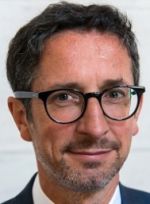 J. Filippini |
Filippov, Ivan (Markelovich) (b. 1905, Nikolayev, Kherson province, Russia - d. Jan. 21, 1963, Simferopol, Crimea oblast, Ukrainian S.S.R.), chairman of the Executive Committee of Crimea oblast (1956-59). He was also chairman of executive committees of Nikolayev (1940-44), Dnepropetrovsk (1947-52), and Izmail (1952-54) oblasti and first secretary of the party committee of Nikolayev oblast (1944-47).
Filippov, Terty (Ivanovich) (b. Jan. 5, 1826 [Dec. 24, 1825, O.S.], Rzhev, Tver province, Russia - d. Dec. 12 [Nov. 30, O.S.], 1899, St. Petersburg, Russia), Russian state comptroller (1889-99).
Filippov, Vasily (Rodionovich) (b. April 27, 1913, Irkhidey ulus, Irkutsk province, Russia - d. 1993), chairman of the Council of Ministers (1958-60) and first secretary of the Communist Party committee (1960-62) of the Buryat A.S.S.R.
Filizzola (Pallarés), Carlos (Alberto) (b. July 24, 1959, Asunción, Paraguay), interior minister of Paraguay (2011-12). He was also mayor of Asunción (1991-96) and president of the Senate (2005-06).
Filizzola (Serra), Rafael (Augusto) (b. Feb. 16, 1968, Asunción, Paraguay), interior minister of Paraguay (2008-11); cousin of Carlos Filizzola.
Filkus, Rudolf (b. Sept. 2, 1927, Bratislava, Czechoslovakia [now in Slovakia] - d. Dec. 17, 2013, Bratislava), finance minister of Slovakia (1994). He was also first deputy premier and minister of control of Czechoslovakia (1992).
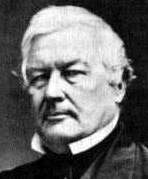 Fillmore |
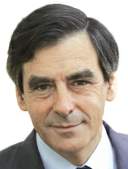 Fillon |
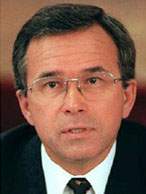 G. Filmon |
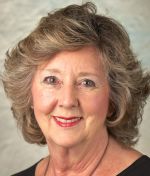 J. Filmon | 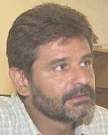 Filmus |
Filmus, Daniel (Fernando) (b. June 3, 1955, Buenos Aires, Argentina), education minister (2003-07) and science and technology minister (2021- ) of Argentina. In 2014-15 he was secretary for Malvinas affairs in the Foreign Ministry.
Filofei, secular name Timofey (Grigoryevich) Uspensky (b. Jan. 27 [Jan. 15, O.S.], 1808, Zakobyakin village, Yaroslavl province, Russia - d. Feb. 10 [Jan. 29, O.S.], 1882), metropolitan of Kiev (1876-82). He was also bishop of Dmitrov (1849-53) and Kostroma (1853-57) and bishop (1857-61) and archbishop (1861-76) of Tver.
Filosofov, Dmitry (Aleksandrovich) (b. Feb. 11 [Jan. 30, O.S.], 1861, St. Petersburg, Russia - d. Dec. 19 [Dec. 6, O.S.], 1907, St. Petersburg), Russian official. He was state comptroller (1905-06) and minister of commerce and industry (1906-07).
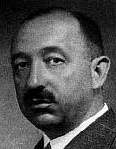 Filov |
Filshin, Gennady (Innokentyevich) (b. Jan. 7, 1931, Maleta, Vostochno-Sibirsky kray [now in Zabaikalsky kray], Russian S.F.S.R. - d. Oct. 13, 2021), Russian politician. He was chairman of the State Committee for Economy and a deputy premier (1990-91) and acting minister of foreign economic relations (1991).
Finali, Gaspare (b. May 20, 1829, Cesena, Papal State [now in Italy] - d. Nov. 8, 1914, Marradi, Firenze province [now Firenze metropolitan city], Italy), treasury minister of Italy (1901). He was also minister of agriculture, industry, and commerce (1873-76) and public works (1889-91).
Finau Tuku'aho (b. 1753 - d. [killed] April 21, 1799), chief (Tu'i Kanokupolu) of Tonga (1797-99).
Finau 'Ulukalala I 'i Ma'ufanga (b. 1748 - d. June 12, 1797) chief of Ha'apai-Vava'u (to 1797).
Finau 'Ulukalala II 'i Feletoa (b. c. 1750 - d. 1809, Vava'u), chief of Ha'apai-Vava'u (1799-1809); son of Finau 'Ulukalala I 'i Ma'ufanga.
Finau 'Ulukalala III Moengangongo (b. c. 1786 - d. 1811, Vava'u), chief of Ha'apai-Vava'u (1809-11); son of Finau 'Ulukalala II 'i Feletoa.
Finau 'Ulukalala IV Tuabayi (d. March 1833, Vava'u), chief of Ha'apai-Vava'u (1811-33); son of Finau 'Ulukalala II 'i Feletoa.
Findlay, William (b. June 20, 1768, Mercersburg, Pennsylvania - d. Nov. 12, 1846, Harrisburg, Pa.), governor of Pennsylvania (1817-20).
 Findley | 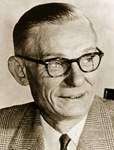 Finet |
Fineanganofo, 'Akosita (Heimuli) (b. 1936 - d. 2009), Tongan diplomat. She was high commissioner to the United Kingdom and ambassador to the United States (1997-2000).
Finet, Paul (Christophe Eloi Ghislain) (b. Nov. 4, 1897, Montignies-sur-Sambre, Belgium - d. May 18, 1965, Luxembourg, Luxembourg), president of the High Authority of the European Coal and Steel Community (1958-59).
Fingland, Frank B(oyd) (b. June 15, 1928, Moose Jaw, Sask.), acting commissioner of Yukon Territory (1978).
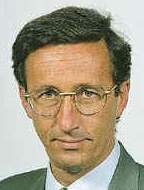 Fini |
Finikaso, Taukelina (Taui) (b. Jan. 10, 1959), foreign minister of Tuvalu (2013-19). He was also high commissioner to Fiji (early 2000s) and minister of communications (2006-10).
Fink, Jodok (b. Feb. 19, 1853, Andelsbuch, Vorarlberg, Austria - d. July 1, 1929, Andelsbuch), vice chancellor of Austria (1919-20).
Finlay, Robert Bannatyne Finlay, (1st) Viscount (b. July 11, 1842, Newhaven, near Edinburgh, Scotland - d. March 9, 1929, London, England), British lord chancellor (1916-19). He was also solicitor general (1895-1900) and attorney general (1900-06). He was knighted in 1895 and created Baron Finlay in 1916 and viscount in 1919.
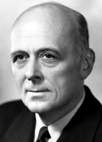 Finletter |
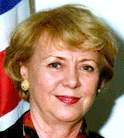 Finnbogadóttir |
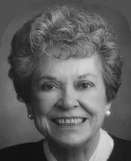 Finney |
Finngård, Gösta (b. Nov. 20, 1885, Älvsbacka, Värmland, Sweden - d. Feb. 7, 1963), acting governor of Gävleborg (1950).
Finniss, Boyle Travers (b. Aug. 18, 1807, at sea off Cape of Good Hope - d. Dec. 24, 1893, Kensington Park, near Adelaide, South Australia), acting governor (1854-55) and premier (1856-57) of South Australia and government resident of the Northern Territory (1864-70).
 Fino |
Finocchiaro Aprile, Camillo (b. Jan. 28, 1851, Palermo, Two Sicilies [now in Sicilia, Italy] - d. Jan. 26, 1916, Rome, Italy), justice minister of Italy (1898-99, 1905-06, 1911-14). He was also minister of posts and telegraphs (1892-93).
Finot Franco, Enrique (b. Sept. 16, 1890, Santa Cruz, Bolivia - d. Dec. 23, 1952, Santa Cruz), foreign minister of Bolivia (1936-37). He was also chargé d'affaires in Peru (1918-20), minister to Chile (1928-29), the United States (1932-36), and Argentina (1938), and ambassador to Mexico (1939-46).
Finsen, (Søren) Hilmar (Steindór) (b. Jan. 28, 1824, Kolding, Denmark - d. Jan. 15, 1886, Copenhagen, Denmark), governor of Iceland (1865-83) and interior minister of Denmark (1884-85). He was also overpræsident of Copenhagen (1883-86).
Finstorp, Lotta, byname of Eva Sofia Katarina Finstorp, née Jonsson (b. Dec. 4, 1958, Jönköping, Sweden), governor of Norrbotten (2021- ).
Fiorina, Carly, née Cara Carleton Sneed (b. Sept. 6, 1954, Austin, Texas), U.S. politician. She was CEO of Hewlett-Packard (1999-2005) and a candidate for the 2016 Republican presidential nomination.
 Mat. Fiorini | 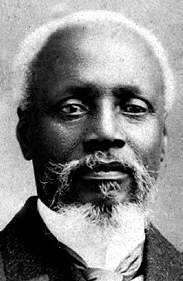 Firmin |
Fiorini, Mauro (b. June 7, 1956), captain-regent of San Marino (1989).
Fiorini, Secondo (d. March 18, 2006), captain-regent of San Marino (1945-46, 1954).
Fiquene, José de Ribamar (b. Dec. 27, 1930, Itapecuru-Mirim, Maranhão, Brazil - d. Jan. 2, 2011, São Luís, Maranhão), acting governor of Maranhão (1994-95). He was also mayor of Imperatriz (1983-88).
Firmeza, Pedro (de Brito) (b. Feb. 17, 1901, Assaré, Ceará, Brazil - d. June 2, 1965, Rio de Janeiro, Brazil), federal interventor in Ceará (1946).
Firmin, (Joseph Auguste) Anténor (b. Oct. 18, 1850, Petite-Anse, near Cap-Haïtien, Haiti - d. Sept. 19, 1911, St. Thomas, Danish West Indies [now U.S. Virgin Islands]), Haitian politician. He was foreign minister (1889-91, 1896) and finance minister (1889-91, 1896-97) and served as Haitian minister in Paris (1900-02) and London. He is noted as the author of L'Égalité des Races Humaines (1885), which challenged the dominant racist views of his day.
Fischbach, Marc (b. Feb. 22, 1946, Luxembourg, Luxembourg), defense minister of Luxembourg (1984-89); son of Marcel Fischbach. He was also minister of agriculture and sport (1984-89), civil service (1984-95), justice (1989-98), education (1989-95), and budget (1995-98) and ombudsman (2004-12).
Fischbach, Marcel (b. Aug. 22, 1914, Luxembourg, Luxembourg - d. June 27, 1980, Luxembourg, Luxembourg), defense minister of Luxembourg (1964-67). He was also ambassador to Switzerland and Austria (1967-73), Belgium (1973-77), and West Germany (1977-79).
Fischer, Abraham (b. April 9, 1850, Cape Town, Cape Colony [now in South Africa] - d. Nov. 16, 1913, Cape Town), prime minister of the Orange River Colony (1907-10) and interior minister of South Africa (1912-13). He was also minister of lands (1910-13).
Fischer (Brusoni), Carlos L(orenzo) (b. 1903, Fray Bentos, Uruguay - d. Aug. 7, 1969), president of the National Council of Government of Uruguay (1958-59).
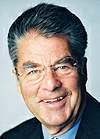 H. Fischer | 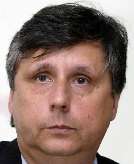 Jan Fischer |
Fischer, Jan (b. Jan. 2, 1951, Prague, Czechoslovakia [now in Czech Republic]), prime minister (2009-10) and finance minister and a deputy prime minister (2013-14) of the Czech Republic. He served as director of the Czech Statistical Office in 2003-09.
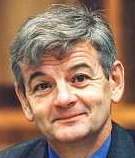 Joschka Fischer |
Fischer, Karl (Ingmar Roman) (b. March 2, 1922, Graz, Austria - d. 2015), Austrian diplomat. He was ambassador to Sweden (1974-79) and Liechtenstein (1981-82) and permanent representative to the United Nations (1982-88).
Fischer, Oskar (b. March 19, 1923, Asch, Czechoslovakia [now As, Czech Republic] - d. April 2, 2020, Berlin, Germany), foreign minister of East Germany (1975-90). He was also ambassador to Bulgaria (1955-59).
Fischer, Pavel (b. Aug. 26, 1965, Prague, Czechoslovakia [now in Czech Republic]), Czech presidential candidate (2018). He was also ambassador to France (2003-10).
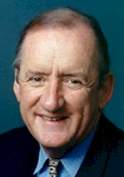 T. Fischer |
Fischer Boel, (Else) Mariann (b. April 15, 1943, Aasum, Denmark), Danish politician. She was minister of food, agriculture, and fisheries (2001-04) and EU commissioner for agriculture and rural development (2004-10).
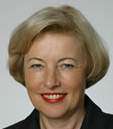 Fischer-Willimann |
Fischler, Franz (b. Sept. 23, 1946, Absam, Tirol, Austria), Austrian politician. He was minister of agriculture and forestry (1989-94) and EU commissioner for agriculture and rural development (1995-2004) and fisheries (1999-2004).
Fish, Hamilton (b. Aug. 3, 1808, New York City - d. Sept. 7, 1893, Garrison, N.Y.), governor of New York (1849-51) and U.S. secretary of state (1869-77).
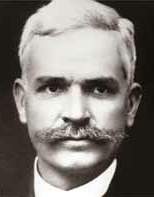 A. Fisher |
Fisher, Linda J(ane) (b. June 26, 1952, Saginaw, Mich.), acting administrator of the U.S. Environmental Protection Agency (2003).
Fishman (Zonzinski), Luis (b. Dec. 30, 1947), Costa Rican politician. He was minister of interior and public security (1990-94), president of the Legislative Assembly (1998-99), second vice president (2002-05), and a minor presidential candidate (2010).
Fiskesjö, Anne-Li (Christina) (b. Feb. 26, 1957), acting governor of Kalmar (2011-12).
Fisseha Yimer (b. Aug. 2, 1940), Ethiopian diplomat. He was ambassador to Austria (1992-96) and Switzerland (1996-2000, 2001-09) and permanent representative to the United Nations (2000).
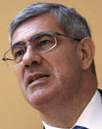 Fissore |
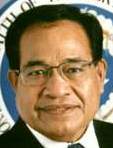 Fitial | 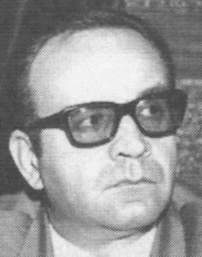 Fitouri |
Fitouri, Mohamed, Arabic Muhammad al-Fituri (b. April 14, 1925, Kairouan, Tunisia - d. April 10, 2006), justice minister (1970-71), finance minister (1971-77), and foreign minister (1977-80) of Tunisia.
Fitoussi, Bernard (b. April 22, 1953, Paris, France), French official. He was prefect of Meuse département (2000-03) and ambassador to Albania (2014-17).
Fitto, Raffaele (b. Aug. 28, 1969, Maglie, Puglia, Italy), president of Puglia (2000-05); son of Salvatore Fitto. He was also Italian minister without portfolio (regional affairs) (2008-11).
Fitto, Salvatore (b. Jan. 2, 1941, Maglie, Puglia, Italy - d. [car crash] Aug. 31, 1988), president of Puglia (1985-88).
Fitzalan of Derwent, Edmund Bernard Fitzalan-Howard, (1st) Viscount, also spelled FitzAlan of Derwent, former surname (1876-1921) Talbot (b. June 1, 1855, London, England - d. May 18, 1947, Windsor, Berkshire, England), lord lieutenant of Ireland (1921-22). He was knighted in 1919 and created viscount in 1921.
Fitzgerald, Charles (b. 1792 - d. Dec. 29, 1887, Kilkee, County Clare, Ireland), governor of Gambia (1844-47) and Western Australia (1848-55).
FitzGerald, Desmond, original name Thomas Joseph FitzGerald (b. Feb. 13, 1888, West Ham, Essex [now part of London], England - d. April 9, 1947, Dublin, Ireland), foreign minister (1922-27) and defence minister (1927-32) of Ireland. He was also minister of publicity (1921-22).
Fitzgerald, Frances, née Ryan, Irish Proinséas Nic Gearailt (b. August 1950, Croom, County Limerick, Ireland), justice minister of Ireland (2014-17). She was also minister of children and youth affairs (2011-14) and business, enterprise, and innovation (2017) and deputy prime minister (2016-17).
 FitzGerald |
Fitzgerald, Gene, byname of Eugene Fitzgerald (b. Aug. 21, 1932, Crookstown, County Cork, Ireland - d. Dec. 14, 2007, Cork, Ireland), finance minister of Ireland (1980-81). He was also minister of labour (1977-80, 1982) and public service (1980-81, 1982).
Fitzgerald, John Francis, byname Honey Fitz (b. Feb. 11, 1863, Boston, Mass. - d. Oct. 2, 1950, Boston), mayor of Boston (1906-07, 1910-13).
Fitzgerald, Maurice A. (d. Aug. 25, 1951), borough president of Queens (1950-51).
Fitzgerald, William (Sinton) (b. Oct. 6, 1880, Washington, D.C. - d. Oct. 3, 1937), mayor of Cleveland (1920-21).
FitzGerald-Kenney, James (Christopher) (b. April 30, 1878, Clogher, County Mayo, Ireland - d. Oct. 21, 1956, Dublin, Ireland), justice minister of Ireland (1927-32).
Fitzgibbon, Joel (Andrew) (b. Jan. 16, 1962, Bellingen, N.S.W.), defence minister of Australia (2007-09). He was also minister of agriculture, fisheries, and forestry (2013).
Fitzpatrick, Sir Charles (b. Dec. 19, 1853, Québec, Canada East [now Quebec] - d. June 17, 1942, Québec), lieutenant governor of Quebec (1918-23); knighted 1907. He was also solicitor general (1896-1902), justice minister (1902-06), and chief justice (1906-18) of Canada.
Fitzpatrick, Sir (Geoffrey Richard) Desmond (b. Dec. 14, 1912, Ash Vale, Hampshire, England - d. Oct. 12, 2002), lieutenant governor of Jersey (1974-79); knighted 1965.
Fitzpatrick, Richard (b. Jan. 24, 1748 - d. April 25, 1813, Westminster [now part of London], England), British secretary at war (1783, 1806-07). He was also chief secretary for Ireland (1782).
FitzRoy, Sir Charles Augustus (b. June 10, 1796 - d. Feb. 16, 1858, London, England), governor of Prince Edward Island (1837-41), Antigua (1842-46), and New South Wales (1846-55); knighted 1854; grandson of Augustus Henry Fitzroy, Duke of Grafton.
FitzRoy, Robert (b. July 5, 1805, Ampton Hall, Suffolk, England - d. [suicide] April 30, 1865, Upper Norwood, Surrey, England), governor of New Zealand (1843-45). He was the scientist who commanded the HMS Beagle on the famous journey with Charles Darwin in 1831-36.
Fitzwilliam, William Wentworth Fitzwilliam, (2nd and 4th) Earl, original name William Fitzwilliam (b. May 30, 1748, Milton House, near Peterborough, Cambridgeshire, England - d. Feb. 8, 1833, Milton House), lord lieutenant of Ireland (1795). He was also British lord president of the council (1794, 1806). He succeeded as 2nd Earl Fitzwilliam in the peerage of Great Britain and 4th Earl Fitzwilliam in the peerage of Ireland in 1756 and added the name Wentworth in 1807.
Five, Haakon Martin (Henriksen) (b. Sept. 27, 1880, Kvam [now part of Steinkjer municipality], Nordre Trondhjems amt [now in Trøndelag fylke], Norway - d. Jan. 15, 1944, Kvam), governor of Nord-Trøndelag (1927-44). He was also Norwegian minister of provisioning (1919-20) and agriculture (1919-20, 1921-23, 1924-26, 1933-35).
Fjærvoll, Dag Jostein (b. Jan. 20, 1947, Hadsel, Nordland, Norway - d. Feb. 4, 2021), defense minister of Norway (1997-99). He was also minister of transport and communications (1999-2000).
Fjermeros, Bue (b. Oct. 21, 1912, Kristiansand, Norway - d. March 11, 2000), governor of Nordland (1951-66) and Vest-Agder (1966-82).
Flach, Carl Georg (b. Sept. 9, 1778 - d. May 8, 1846, Stockholm, Sweden), governor of Älvsborg (1817-25).
Flach, Émile (Henri) (b. Feb. 24, 1853, Bastia, Corse, France - d. Feb. 17, 1926), minister of state of Monaco (1911-17).
Flæte, Oddvar J(ohannes) (b. March 31, 1944, Årdal, Sogn og Fjordane [now in Vestland], Norway), governor of Sogn og Fjordane (1994-2011).
Flaherty, Jim, byname of James Michael Flaherty (b. Dec. 30, 1949 - d. April 10, 2014, Ottawa, Ont.), finance minister of Canada (2006-14).
Flaherty, Peter F(rancis) (b. June 25, 1924, Pittsburgh, Pa. - d. April 18, 2005, Mount Lebanon, Pa.), mayor of Pittsburgh (1970-77). A Democrat, he was elected mayor in 1969 after touting himself as "Nobody's Boy," a reference to not being controlled by the Democratic machine that helped elect past mayors. He served as deputy U.S. attorney general for less than a year, stepping down in December 1977 to run for Pennsylvania governor. He lost the 1978 election to Richard Thornburgh. He also lost U.S. Senate bids to Richard Schweiker in 1974 and Arlen Specter in 1980. He was elected as Allegheny County commissioner in 1983, serving in that position until 1995.
Flamarique, (Mario) Alberto (b. Jan. 19, 1950, Mendoza, Argentina), labour minister of Argentina (1999-2000).
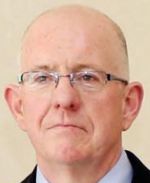 C. Flanagan |
Flanagan, Oliver J(ames) (b. May 22, 1920, Mountmellick, County Laois, Ireland - d. April 26, 1987, County Laois), defence minister of Ireland (1976-77).
Flandin, Étienne (Jean Marie) (b. April 1, 1853, Paris, France - d. Sept. 20, 1922, Paris), resident-general of Tunisia (1918-21).
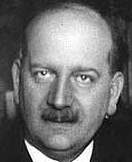 P.É. Flandin |
Flangini (Ximénez), (Miguel) Alberto (b. 1824 - d. 1900), foreign minister (1856, 1866-68) and acting president (1882) of Uruguay.
Flanking, (Per) Anders (Daniel) (b. Oct. 4, 1957, Skövde, Skaraborg [now in Västra Götaland], Sweden), governor of Kronoberg (acting, 2016-17) and Gotland (2019- ).
Flavian, secular name Nikolay (Nikolayevich) Gorodetsky (b. Aug. 7 [July 26, O.S.], 1840, Oryol, Russia - d. Nov. 17 [Nov. 4, O.S.], 1915, Kiev, Russia [now in Ukraine]), metropolitan of Kiev (1903-15). He was also bishop of Aksay (1885), Lublin (1885-91), and Kholm and Warsaw (1891-92), archbishop of Kholm and Warsaw (1892-98) and Kharkov (1901-03), and exarch of Georgia (1898-1901).
Flaxman, Sir Hubert (James Marlowe) (b. July 22, 1893 - d. June 23, 1976), British resident commissioner of the New Hebrides (1950-55); knighted 1962. He was chief justice of Gibraltar in 1955-65.
Fleetwood, Carl Mårten friherre (b. Jan. 22, 1703 - d. April 2, 1751, Nyköping, Södermanland, Sweden), governor of Halland (1745-50) and Södermanland (1750-51); son of Georg Vilhelm friherre Fleetwood.
Fleetwood, Georg Vilhelm friherre (b. Sept. 26, 1669, Svanaholm, Jönköping, Sweden - d. April 17, 1728, Kalmar, Sweden), governor of Kalmar (1721-28).
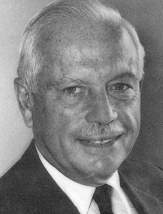 D. Fleming |
Fleming, (Hugues) Élie, mayor of Saint-Martin (1949-59, 1977-83); son of Emmanuel Fleming.
Fleming, (Louis) Emmanuel, mayor of Saint-Martin (1919-25).
Fleming, Sir Francis (b. 1842 - d. Dec. 4, 1922), governor of Sierra Leone (1892-94) and the Leeward Islands (1895-1901); knighted 1892.
Fleming, Iolanda Lima (b. June 20, 1936, Vila Castelo [now in Manoel Urbano municipality], Acre, Brazil), acting governor of Acre (1986-87).
Fleming, Louis Constant (d. Jan. 29, 1949), mayor of Saint-Martin (1928-49); son of Emmanuel Fleming; son-in-law of Charles Daniel Esprit Beauperthuy.
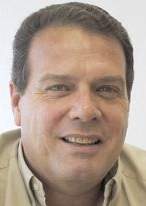 L.C. Fleming (1946- ) | 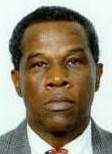 O. Fleming |
Fleming, Osbourne (Berlington) (b. Feb. 18, 1940, East End, Anguilla), chief minister of Anguilla (2000-10).
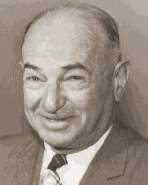 R.J. Fleming |
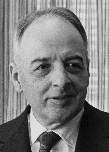 A.S. Flemming |
Flemming, Charles Stephen (b. Oct. 30, 1948, Castries, Saint Lucia), Saint Lucian diplomat. He was permanent representative to the United Nations (1989-94).
Flensborg, Carl Julius (b. July 2, 1804, Copenhagen, Denmark - d. July 23, 1852, Copenhagen), war minister of Denmark (1851-52).
Flesch, Colette (b. April 16, 1937, Dudelange, Luxembourg), foreign minister of Luxembourg (1980-84). She was also mayor of Luxembourg city (1970-80) and deputy prime minister and minister of foreign trade, economic affairs, middle classes, and justice (1980-84).
 E. Fletcher |
Fletcher, Henry P(rather) (b. April 10, 1873, Greencastle, Pa. - d. July 10, 1959, Newport, R.I.), chairman of the Republican National Committee (1934-36). He was also U.S. minister to Chile (1910-14) and ambassador to Chile (1914-16), Mexico (1917-19), Belgium (1922-24), Luxembourg (1923-24), and Italy (1924-29).
Fletcher, Raphael (O.W.) (b. Dec. 16, 1927 - d. Jan. 9, 2014), foreign minister of Grenada (1997-98).
Fleuriau d'Armenonville, Joseph Jean-Baptiste (b. Jan. 22, 1661 - d. Nov. 27, 1728, near Paris, France), French politician. He was minister of marine and colonies (1718-22) and keeper of the seals (1722-27).
Fleuriot de Langle, Alphonse Jean René, vicomte (b. May 16, 1809, Pradalon manor, Plouigneau, Finistère, France - d. July 22, 1881, Paris, France), commandant of the Naval Division of the Western Coasts of Africa (1866-68).
Fleury, André Augusto de Padua (b. April 9, 1830, Cuiabá, Mato Grosso, Brazil - d. Nov. 25, 1895, Rio de Janeiro, Brazil), president of Espírito Santo (1863), Paraná (1864-65, 1865-66), and Ceará (1880-81). He was also Brazilian minister of agriculture, commerce, and public works (1882).
Fleury, Antonio de Padua (b. Dec. 8, 1795, Santa Cruz, Goiás, Brazil - d. Nov. 14, 1859, Goiás, Goiás), president of Goiás (1848-49); brother of Luiz Gonzaga de Camargo Fleury.
 L.A. Fleury |
Fleury, Luiz Gonzaga de Camargo (b. June 21, 1793, Meia Ponte [now Pirenópolis], Goiás, Brazil - d. Dec. 29, 1846, Meia Ponte), president of Goiás (1837-39).
Fleva, Nicolae (b. 1840, Focsani, Moldavia [now in Romania] - d. Aug. 4, 1920, Jideni, Romania), interior minister of Romania (1895-96). He was also mayor of Bucharest (1884-86), minister of agriculture, industry, commerce, and domains (1899-1900), and minister to Italy (1901-09).
Fleysher, Sergey (Nikolayevich) (b. Feb. 4, 1856, Moscow, Russia - d. Dec. 27, 1918), interim governor-general of Yelizavetpol (1904, 1905-06, 1908-09) and governor of Terek oblast (1912-17).
Flick, Giovanni Maria (b. Nov. 7, 1940, Cirié, Torino province [now Torino metropolitan city], Piemonte, Italy), justice minister of Italy (1996-98). He was also president of the Constitutional Court (2008-09).
Floissac, Sir Vincent (Frederick) (b. July 31, 1928 - d. Sept. 25, 2010), acting governor-general of Saint Lucia (1987-88); knighted 1992. He was chief justice of the Eastern Caribbean Supreme Court in 1991-96.
Floquet, Charles (Thomas) (b. Oct. 2, 1828, Saint-Jean-Pied-de-Port, Basses-Pyrénées [now Pyrénées-Atlantiques], France - d. Jan. 18, 1896, Paris, France), prefect of Seine département (1882) and president of the Chamber of Deputies (1885-88, 1889-93) and prime minister and interior minister (1888-89) of France.
Flor (Valle), Miguel Ángel de la (b. March 11, 1924, Ferreñafe, Lambayeque, Peru - d. Jan. 12, 2010, Lima, Peru), foreign minister of Peru (1972-76).
Flor Torres, Manuel Elicio (b. 1891, Riobamba, Ecuador - d. ...), Ecuadorian presidential candidate (1948). He was also president of the Supreme Court (1953, 1959).
Florentín Antola, Raúl Alberto, Paraguayan diplomat; son of Dido Florentín Bogado. He has been ambassador to Germany (2010-14) and Japan (2017- ).
Florentín Bogado, Dido (b. April 28, 1930, Coronel Bogado, Paraguay), foreign minister of Paraguay (1998-99). He was also ambassador to Belgium, the Netherlands, and Luxembourg (1984-91), Argentina (1991-94), and Brazil (1994-97).
Florentín Peña, Ángel (b. March 1, 1898, Concepción, northern Paraguay - d. ...), foreign minister of Paraguay (1952-53). He was also ambassador to Argentina (1949-50) and Chile (1957-59).
Flores, Adolfo, interior (and posts and telegraphs) minister of Bolivia (1923).
Flores, Ángel (b. Oct. 2, 1883, San Pedro [according to other sources Lo de Sauceda], Navolato municipality, Sinaloa, Mexico - d. [possible suicide] March 31, 1926, Culiacán, Sinaloa, Mexico), governor of Sinaloa (1920-24).
Flores (Rondón), Antonio, justice and education minister of Peru (1910, 1910-11).
Flores, Carlos Thompson (b. June 4, 1843, Porto Alegre, Rio Grande do Sul, Brazil - d. Nov. 10, 1904, Porto Alegre), president of Rio Grande do Sul (1879-80).
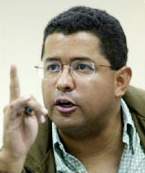 F. Flores |
 J.F. Flores |
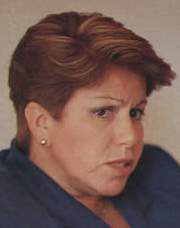 Lourdes Flores |
Flores (Medina), Luis A(lberto) (b. Oct. 11, 1899, Ayabaca, Peru - d. May 29, 1969, Lima, Peru), prime minister of Peru (1932). He was also minister of interior and police (1932) and navy and aviation (1933), a presidential candidate (1936), and ambassador to Italy (1948-50) and Paraguay (1956-62).
Flores (Maldonado Martínez de Angulo y Bodquín), Manuel Antonio (b. 1723, Sevilla, Spain - d. March 20, 1799, Madrid, Spain), viceroy of New Granada (1776-82) and New Spain (1787-89).
Flores (Loáisiga), Mario (José), finance minister of Nicaragua (2006-07).
Flores (Gaviño), Ricardo L(orenzo) (b. Aug. 10, 1854, Lima, Peru - d. Nov. 15, 1939, Lima), acting foreign minister of Peru (1918). He was also minister of development (1897-98) and justice and education (1917-18).
Flores, Sylvia (Sarita) (b. Nov. 27, 1951, Stann Creek, British Honduras [now Dangriga, Belize] - d. Dec. 8, 2022, Dangriga), defence minister of Belize (2003-04). She was also speaker of the House of Representatives (1998-2001), president of the Senate (2001-03), and minister of human development (2004-08).
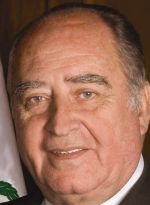 Flores-Aráoz |
Flores Avendaño, Guillermo (b. 1894, San Andrés Itzapa, Chimaltenango, Guatemala - d. May 26, 1982, Guatemala City, Guatemala), acting president of Guatemala (1957-58). He was appointed defense minister in 1958 but did not accept the post. He was also ambassador to Mexico (1958-59) and Italy (1959-61) and permanent representative to the United Nations (1962-63).
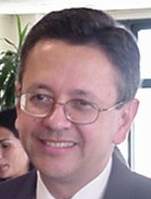 R. Flores B. |
Flores Chinarro (y Guerrero), Francisco (b. Oct. 4, 1838, Ica, Peru - d. Feb. 18, 1889, Tarma, Peru), foreign minister of Peru (1883).
Flores de la Peña, Horacio (b. July 24, 1923, Saltillo, Coahuila, Mexico - d. May 17, 2010, Mexico City, Mexico), Mexican politician. He was minister of national patrimony (1970-75) and ambassador to France (1977-83), the Soviet Union (1983-88), Italy (1988-90), Chile (1990-93), and the Czech Republic (1993-96).
Flores Dueñas, Carlos (b. Nov. 18, 1947, Colima, Colima, Mexico), interim governor of Colima (2003).
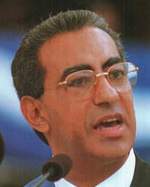 C.R. Flores |
Flores Flake, Mary Elizabeth (b. Dec. 6, 1973, Tegucigalpa, Honduras), Honduran diplomat; daughter of Carlos Roberto Flores Facussé. She has been permanent representative to the United Nations (2010- ).
Flores Labra, (Carlos) Fernando (b. Jan. 9, 1943, Talca, Chile), finance minister of Chile (1973). He was also minister of economy, development, and reconstruction (1972). Arrested after the 1973 coup, he was released and exiled to the U.S. in 1976.
Flores Muñoz, Gilberto (b. May 4, 1906, Compostela, Nayarit, Mexico - d. [assassinated] Oct. 6, 1978, Mexico City, Mexico), governor of Nayarit (1946-51). He was also Mexican minister of agriculture (1952-58).
Flores Olea, Víctor (Manuel) (b. Aug. 24, 1932, Toluca, México, Mexico - d. Nov. 22, 2020, Acapulco, Guerrero, Mexico), Mexican diplomat. He was ambassador to the Soviet Union (1975-77) and permanent representative to the United Nations (1994-95).
Flores Sánchez, Óscar (b. June 22, 1907, Chihuahua, Chihuahua, Mexico - d. Nov. 21, 1986, Chihuahua, Chihuahua), governor of Chihuahua (1968-74). He was also Mexican attorney general (1976-82).
Flores Torres, Jorge (León) (b. April 11, 1929, Pocollay, Tacna, Chile [now in Peru]), war minister of Peru (1985-87).
Flores Vega, Antonio (b. 1887, Masaya, Nicaragua - d. 19...), interior minister of Nicaragua (1932-33). He was also minister of development (1929-32).
Florescu, Ioan Emanoil (b. Aug. 7, 1819, Râmnicu Vâlcea, Walachia [now in Romania] - d. May 10, 1893, Paris, France), minister of war of Walachia (1859-60, 1860-61) and Moldavia (1860-61) and minister of war (1862-63, 1871-76) and interior (1865-66, 1876) and prime minister (1876, 1891) of Romania. He was also chief of the General Staff (1860, 1864-66) and president of the Senate (1888-89, 1890-91).
Floridablanca, José Moñino y Redondo, (I) conde de (b. Oct. 21, 1728, Murcia, Spain - d. Dec. 30, 1808, Sevilla, Spain), first secretary of state (1777-92) and president of the Supreme Central Governing Junta (in Resistance, 1808) of Spain. He was created count in 1773.
Florijancic, Joze (b. Jan. 9, 1935, Otocec ob Krki, Yugoslavia [now in Slovenia]), finance minister of Yugoslavia (1982-83).
Florin, Peter (b. Oct. 2, 1921, Cologne, Germany - d. Feb. 16/17, 2014, Berlin, Germany), president of the UN General Assembly (1987-88). He was also East German ambassador to Czechoslovakia (1967-69) and permanent representative to the UN (1973-82).
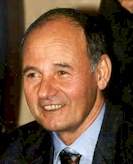 Floris |
Florit, Carlos Alberto (b. April 13, 1929, Buenos Aires, Argentina - d. Jan. 18, 2010, San Isidro, Buenos Aires province, Argentina), foreign minister of Argentina (1958-59).
 Flosse |
Flottes de Pouzols, (Jacques) Marie Alphonse (b. March 12, 1884 - d. Aug. 26, 1935), acting governor of Ivory Coast (1935).
Flouret, Marcel (Pierre) (b. March 29, 1892, Bergerac, Dordogne, France - d. Nov. 29, 1971, Fontainebleau, Seine-et-Marne, France), prefect of Seine département (1944-46).
Floyd, John (b. April 24, 1783, "Floyd's Station," Jefferson county, Va. [in present St. Matthews, Ky.] - d. Aug. 16, 1837, Montgomery county, Va.), governor of Virginia (1830-34).
Floyd, John B(uchanan) (b. June 1, 1806, Montgomery county, Va. - d. Aug. 26, 1863, near Abingdon, Va.), governor of Virginia (1849-52) and U.S. secretary of war (1857-60); son of John Floyd.
Flynn, Padraig, Irish Pádraig Ó Floinn (b. May 9, 1939, Castlebar, County Mayo, Ireland), justice minister of Ireland (1992-93). He was also minister of Gaeltacht (1982), trade, commerce, and tourism (1982), environment (1987-91), and industry and commerce (1992-93) and European commissioner for social affairs (1993-99).